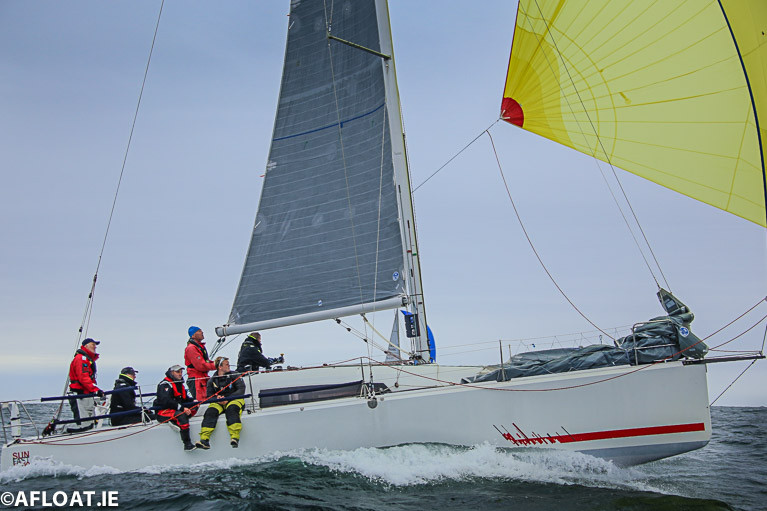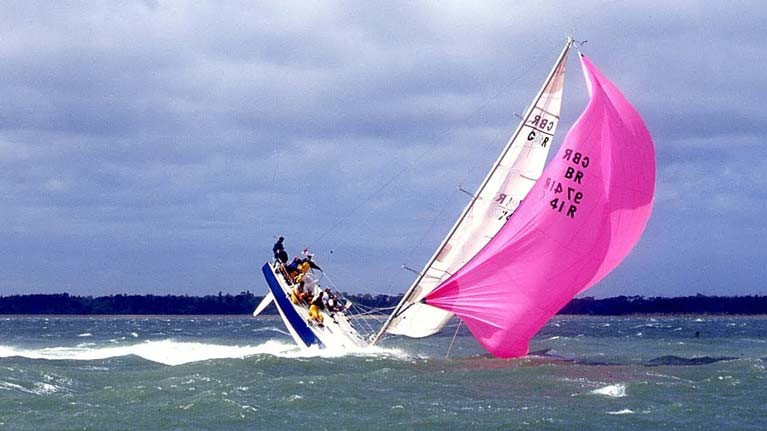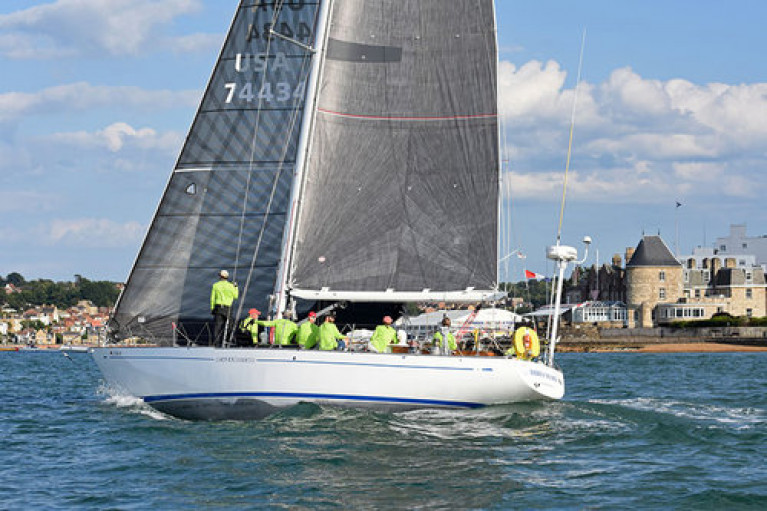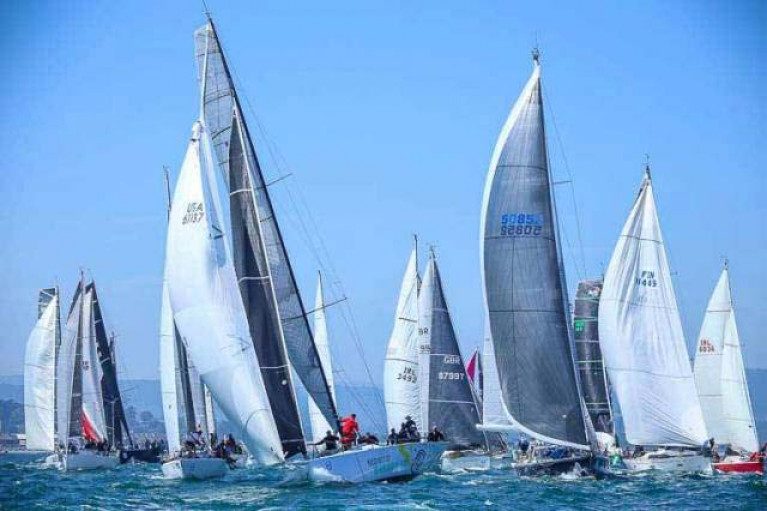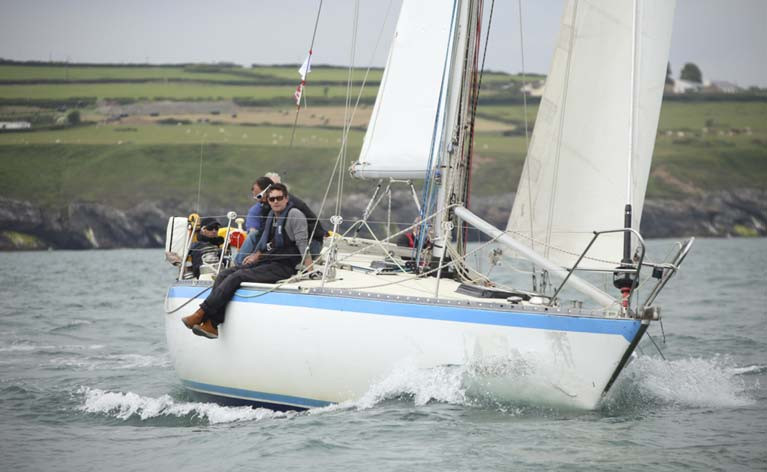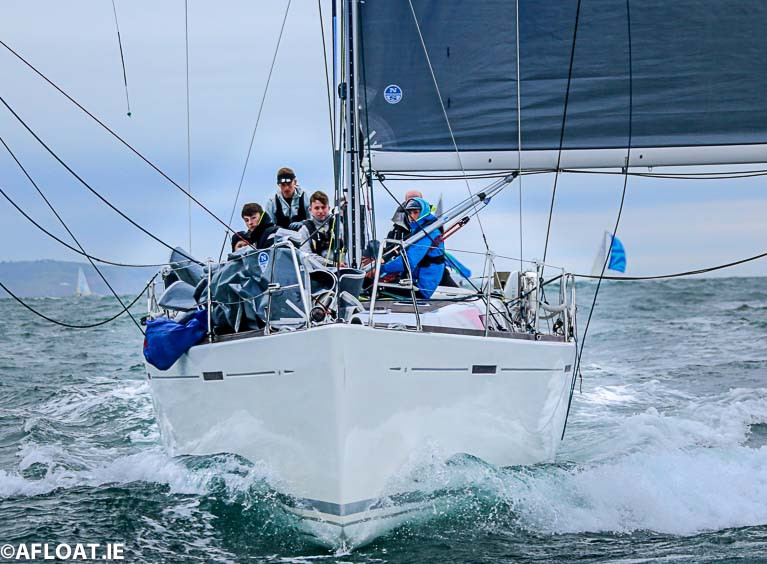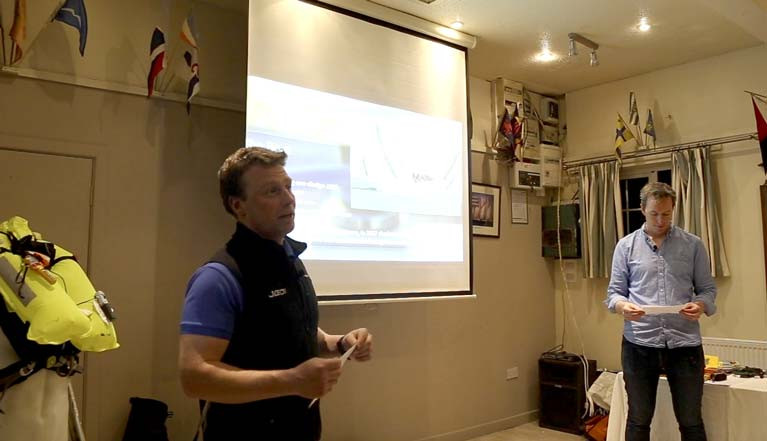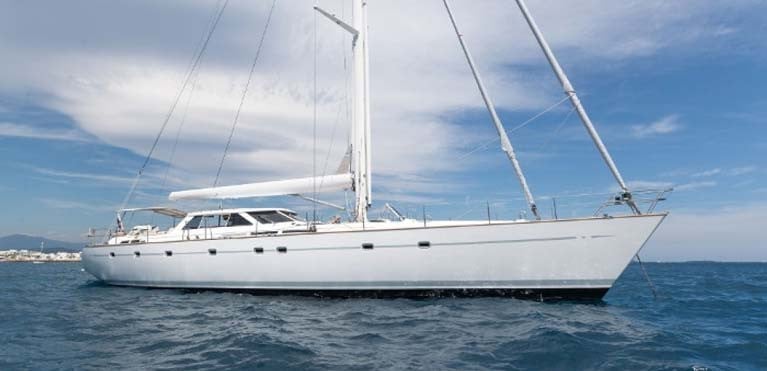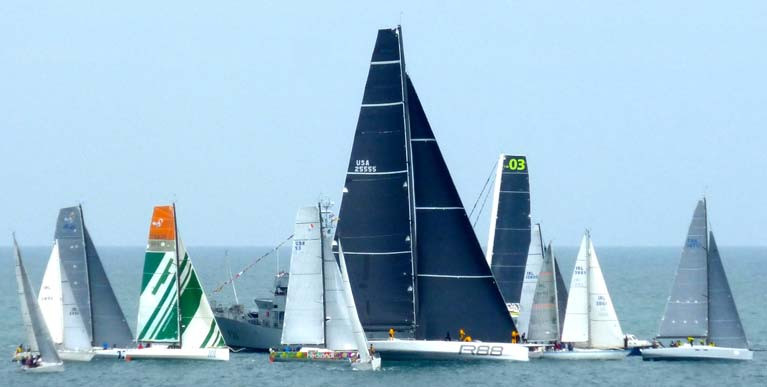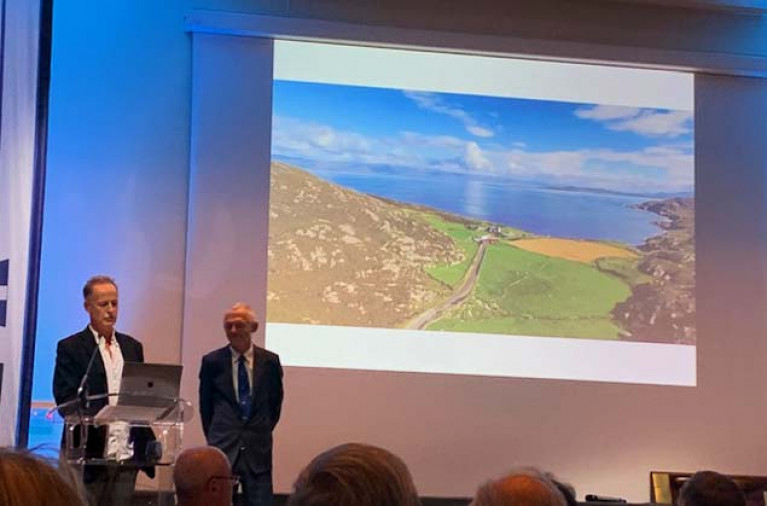Displaying items by tag: Round Ireland Yacht Race
National Yacht Club Sun Fast 3600 'Hot Cookie' is Latest Round Ireland Yacht Race Entry
The latest entry into the SSE Renewables Round Ireland Race is Dublin Bay’s Jeanneau Sun Fast 3600, 'Hot Cookie'. As David O'Brien points out in this morning's Irish Times newspaper the race entry is building towards a record entry.
The National Yacht Club’s John O’Gorman skippered this new design to third overall in the 2019 Dún Laoghaire to Dingle Race so it is yet another prospect for Round Ireland’s overall IRC prize.
40 boats have entered so far to make good on Wicklow Sailing Club's prediction of 60 boats for the June 20th start.
Much more on the story in the Irish Times here.
Ireland’s Sailing Sport is No Laughing Matter
When a country is brooding under the gloom of a developing and lethal global pandemic, you’d have thought that something mildly light-hearted such as the weekend’s Sailing on Saturday creation of a virtual launch party at the Royal Irish Yacht Club for Wicklow Sailing Club’s SSE Renewables Round Ireland Race 2020 might have helped to brighten the national mood, in however small a way.
But not everyone agreed. Indeed, some made it clear in private communications that this wouldn’t do at all. The cancellation and its implications were apparently a very serious business and should be treated as such. We couldn’t help but be reminded of Liverpool manager Bill Shankly’s reply - when asked if football was as important as life and death - that in fact, the beautiful game was much more important than life and death.
In Ireland in particular, you make jokes about sport at your peril. For sure, proven fellow participants can make jokes about individual sportsmen’s predicaments, and our header photo has been a happy hunting ground for sometimes savagely droll peer comment. But as for making jokes about sport for a general readership – that is totally verboten.
We were reminded of this back in the day when we used to write a weekly newspaper column about sailing when Ireland was covered in newsprint. An American acquaintance from San Francisco commented that although his home town was served by no less than three reputable daily newspapers and the Greater Bay Area was full of sailing and power boats, not one of the city’s three newspapers carried a regular sailing column.
Yet in Ireland by contrast, people seemed to take their sporting journalism very seriously indeed - however much of a minority interest was being covered - and every national newspaper had a regular sailing column, summer and winter.
Thus it came about that when headline-grabbing stories about the use of performance-enhancing drugs in sports as various as swimming and cycling and distance running were dominating the sports news, I popped in a column about how sailing also shared this problem. The use of performance-enhancing drugs was rife in Irish sailing, and I could prove it.
This caused quite a flurry in the sports pages sub-editing sweatshop, where they were thinking about making it the lead story. But a reference to the paper’s on-call libel lawyer calmed them down. He pointed out that the performance-enhancing drugs in question were clearly discussed as being taken after the event.
These performance-enhancing drugs amounted to no more than the usual heap of pints which crews consumed in the club after racing (for this was a very long time ago), as a result of which a boat and crew which had turned in a mediocre performance gradually found, as the juices flowed, that they’d actually been more or less in the middle of the fleet. Only in sailing – and in Irish sailing at that – are performance-enhancing drugs taken after the event. And they’re used to such good effect that by the time our gallant matelots finally reeled homewards into the night and properly awash, they were fully convinced they’d been solidly in the frame.
So the column was used in its entirety, but believe it or not, it was given an editorial introduction to make sure that everyone realised it was trying to lighten the mood. For the editor well knew that dyed-in-the-wool sports fans regarded every blessed written word on all sorts of competition as Holy Writ, and you just didn’t make jokes - however feeble - about any sport in a general kind of way.
That said, because sailing does carry an element of danger, there’s a tendency within the sport to a certain amount of gallows humour about the predicaments of others. It can be dependent on cultural background. Up on Belfast Lough, the tone seems still to be set by the rugged nature of working in the shipyard, where the foremen were wont to wear bowler hats. This wasn’t vanity. It was because a particularly demanding foreman would know that anyone with a grievance against him might well - when working at a height - accidentally drop a large rivet aimed right at his head as he strode along at ground level.
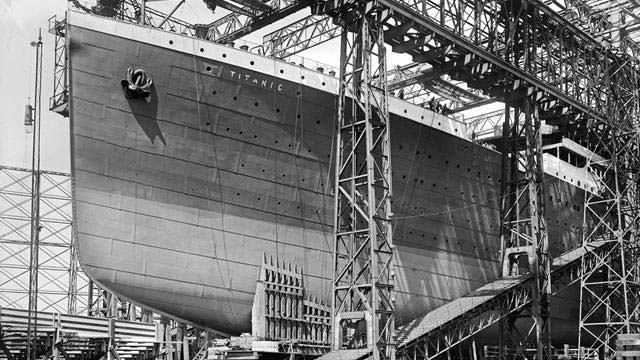 The rough tough world of ultimate ship-building as the Titanic nears completion in Belfast. The bowler hats of the bosses were more than ornamental indications of rank, they were vital personal protection
The rough tough world of ultimate ship-building as the Titanic nears completion in Belfast. The bowler hats of the bosses were more than ornamental indications of rank, they were vital personal protection
Consequently, the bowler hat was actually a steel-reinforced crash helmet for protection against personal and ever-present danger. In such a social climate, anyone making a mistake was quickly singled out for cruel derision, both in work and at play. Thus in some Belfast Lough sailing events nowadays, it’s still regarded as hilarious to honour some unfortunate mistake-maker after each day’s racing for acclamation as “The Mug of the Day”.
Each to their own and welcome to it, as you might say. In these surreal times, we can only conclude with some advice from a member of the Waterford sailing community as to how best to stock up for the Self-Isolation which many of us may have to resort to in order to get through the Covid-19 quarantine period.
Apparently the answer is to buy After Eight Mints and Carr’s Miniature Table Water Biscuits in industrial quantities. The word from Waterford is that, after you’ve been isolated, this will be the only nourishment that your family will be able to slide in under the door.
There’s a rumour going around about the cancellation of this week’s traditional Dublin launch in the Royal Irish Yacht Club of the biennial SSE Renewables Round Ireland Race, due to start from Wicklow Sailing Club on June 20th. The rumour mills would have it that the always convivial gathering – scheduled for Wednesday – had to be called off, or at least postponed, in a properly sensible response to the gathering clouds of the Covid-19 epidemic threat.
In the Actual World and in Real Time, the cancellation did indeed take place. But in the Virtual World where many of us live today, Afloat.ie is delighted to reveal that this popular and always interesting gathering did in fact take place, and though some attendees will have impressions of the event which differ markedly from others, isn’t that always the case with the recollections of any good party?
We won’t go so far as to suggest that anyone who claims to remember the event in precise detail simply can’t have been there, but at times it was definitely getting into being that kind of party. For the way it is, every second year it’s that special evening of early Spring when Wicklow asserts its identity as a place apart, a proper little commercial and sailing port town which definitely isn’t an outlying commuter extension of Dublin.
On the contrary, it’s a town of great individuality where they’ve a huge billboard on the edge of town telling you to go to gaol, a quaint port whose small but hugely enthusiastic sailing club inaugurated the first non-stop 704-mile Round Ireland Race forty years ago, and in 2020 is staging the 21st edition of what is now an international classic. They sustain it with the full support of the Royal Ocean Racing Club, and the whole-hearted backing of the Royal Irish Yacht Club which, in a gesture which speaks volumes, is happy to be seen as the Dublin Bay Out Station of Wicklow SC in order to provide berthing support and a sort of WSC Embassy for entrants that are too large to use Wicklow’s characterful little harbour.
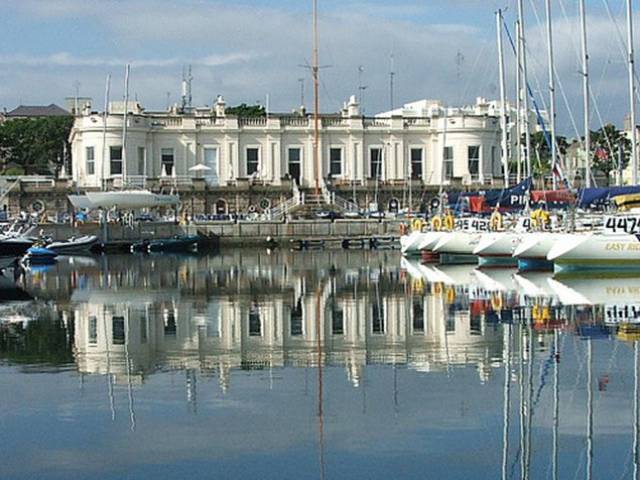 Pavilion of Dreams……The Royal Irish YC in Dun Laoghaire was the ideal setting for a virtual launch party on Wednesday evening
Pavilion of Dreams……The Royal Irish YC in Dun Laoghaire was the ideal setting for a virtual launch party on Wednesday evening
It will be clear from all this that even in the best of times it is difficult to tell where reality ends and fantasy begins in the story of the Round Ireland Race, and when our Real World is in chaos, it’s a relief to allow the Virtual World to step in and keep things on track.
Thus it was that a virtual group of active volunteers and supporters from Wicklow Sailing Club headed Dun Laoghaire-wards on Wednesday afternoon led by Race Director Hal Fitzgerald, and at the Royal Irish they met up with Barry Kilcline of SSE Renewables which, among other projects, is currently developing the next phase of the Arklow Bank Wind Park off the Wicklow coast.
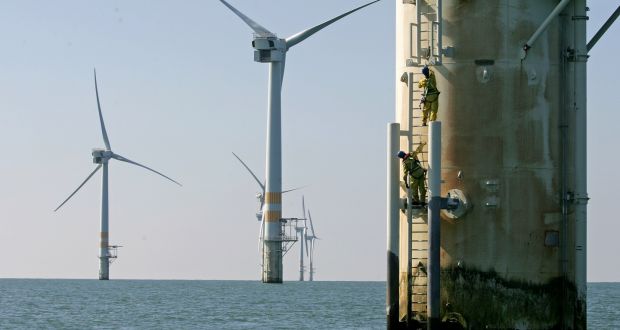 Power for the People….the Arklow Bank Wind Park off the Wicklow Coast is an SSE Renewable project. Photo Afloat.ie/David O’Brien
Power for the People….the Arklow Bank Wind Park off the Wicklow Coast is an SSE Renewable project. Photo Afloat.ie/David O’Brien
At the RIYC they met up with WSC Commodore Kyran O’Grady, who was fresh in from Connemara, that glorious part of the country where his renowned thatching skills are so highly regarded that he has been doing work on the roof of the Recording Studio near Roundstone of a certain legendary figure in the Irish and international music scene.
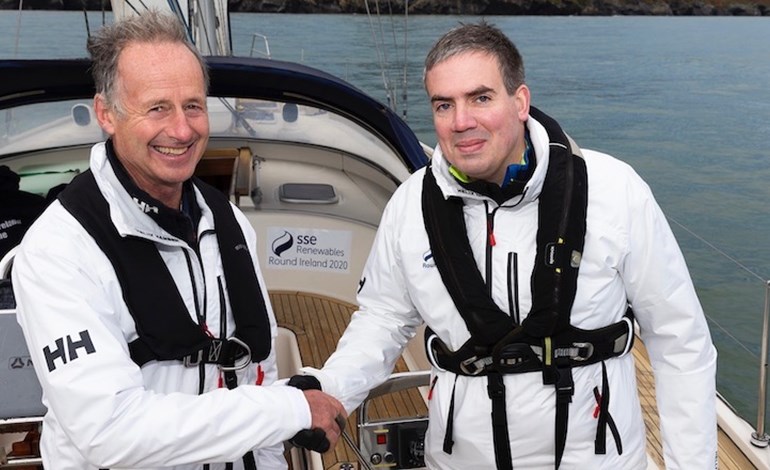 Thatching and turbines get together – Wicklow SC Commodore Kyran O’Grady with Barry Kilcline of SSE Renewables. Photo WSC
Thatching and turbines get together – Wicklow SC Commodore Kyran O’Grady with Barry Kilcline of SSE Renewables. Photo WSC
’Tis far from a thatched roof that the neo-classical design of the 1851-built Royal Irish Yacht Club originated, but nevertheless its stately ambience was an appropriate setting for a gathering which brought together so many strands of Irish and world sailing. All of them were united in support of Wicklow SC’s gallantry in keeping this round Ireland show on the road through times thick and thin, with RIYC Commodore Joe Costello welcoming an eclectic attendance which well reflected the extraordinary hold that this very special event has on those who take part in it – some of them many times, very many times in several cases.
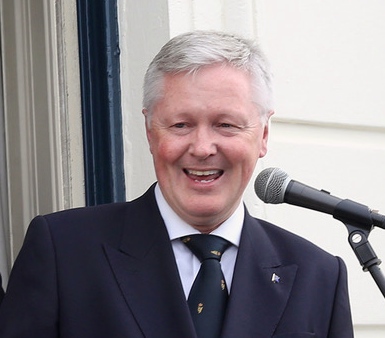 A warm virtual welcome – RIYC Commodore Joe Costello. Photo: Deirdre Power
A warm virtual welcome – RIYC Commodore Joe Costello. Photo: Deirdre Power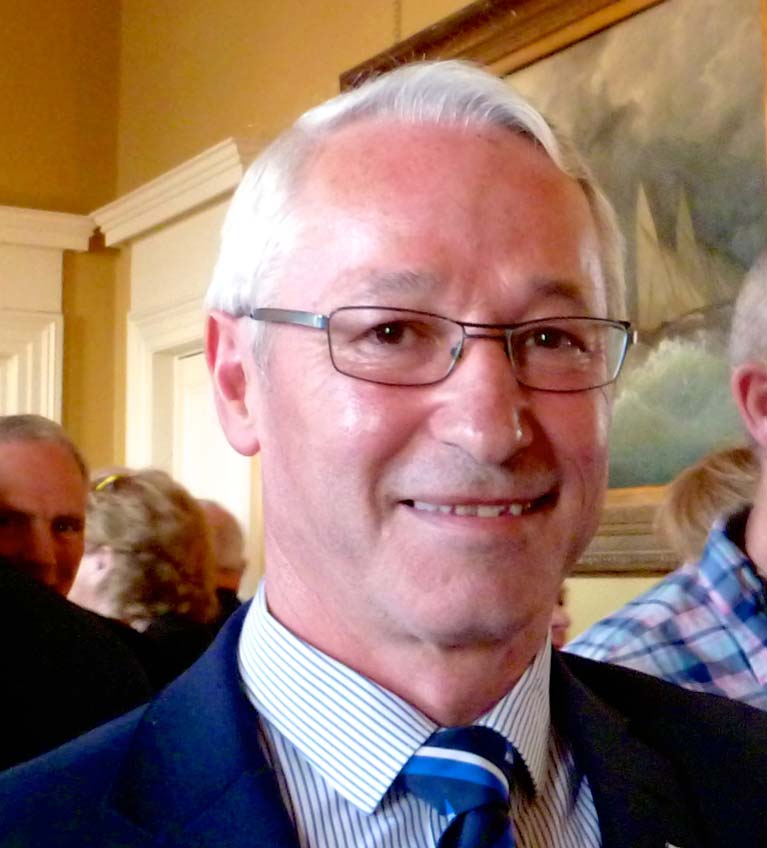 Race Director Hal Fitzgerald. Photo: W M Nixon
Race Director Hal Fitzgerald. Photo: W M Nixon
The list of winners both on Corrected Time and in Line Honours well reflects this, while we get an even more telling impression from ranking the clubs of those winners:
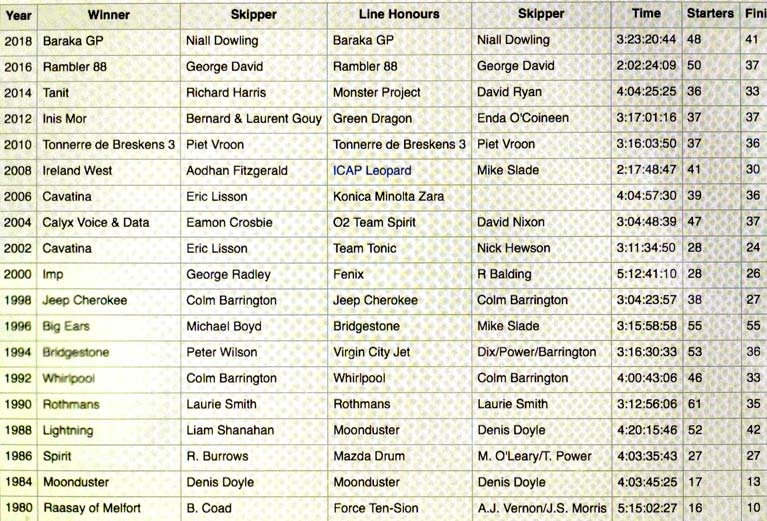 The winners of the Round Ireland Race have come from 12 different clubs and seven different countries
The winners of the Round Ireland Race have come from 12 different clubs and seven different countries
The Royal Cork Yacht Club and the Royal Irish YC top the table with four winners apiece, the Royal Cork launched on their way with Denis Doyle’s two famous victories in 1982 and 1984 with Moonduster.
Home Clubs of Round Ireland Winners:
- Royal Cork YC: 4
- Royal Irish YC: 4
- Howth Yacht Club: 2
- National Yacht Club: 2
- Kinsale YC: 1
- New York Yacht Club: 1
- Clyde Cruising Club:1
- Yacht Club Breskens: 1
- Galway Bay Sailing Club: 1
- Clifden Boat Club: 1
- Lymington Town Sailing Club: 1
- Waterford Harbour Sailing Club: 1
Clifden Boat Cub was the named home club of France’s Bernard & Laurent Gouy - winners in 2012 with the Ker 39 Inis Mor - who have a family holiday place in Connemara. Breskens is, of course, the great Piet Vroon, winner with Tonnere de Breskens 3 in 2010, while Lymington Town SC crops up thanks to Lawrie Smith’s double win with Rothman’s in 1990, though he could equally have named Glandore Harbour YC, as his parents acquired a little place there in the 1960s. And Waterford Harbour SC is, of course, the late Brian Coad, winner of the first race in 1980 with the Rival 34 Raasay of Melfort.
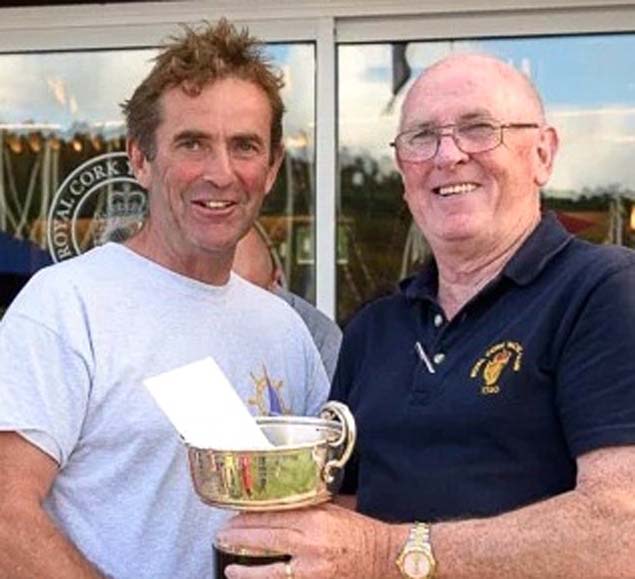 Cobh lads together - George Radley accepting the RCYC Half Ton Trophy from Admiral Pat Farnan. Photo: Robert Bateman
Cobh lads together - George Radley accepting the RCYC Half Ton Trophy from Admiral Pat Farnan. Photo: Robert Bateman
Thus there’s a lot of experience to draw on from past Round Ireland Races, and on Wednesday’s we’d a virtual panel discussion which took us through the experiences of George Radley of Cobh – winner with the immortal Imp in 2000 and almost winner again in 2002 when it was snatched at the last minute by fellow Corkman Eric Lisson with the Noray/Granada 38 Cavatina. Also involved was sailmaker Maurice “The Prof” O’Connell, who was right there with Mark Mansfield when they combined to give Dave Cullen class victory with the J/109 Euro Car Parks in 2016, and also called the shot in 2018 for the vital move which got Chris Power Smith’s J/122 Aurelia out of the Donegal flat patch and right into the frame in class and overall in 2018.
The panel was completed by Anna Walsh, who was with Peter Wilson on the J/35 Bridgestone for overall victory in 1994 in a varied career afloat which included top-level J/24 involvement and windsurfing and is now getting back to her favourite sailing activity of offshore racing on Paul O’Higgins’ all-conquering JPK 10.80 Rockabill VI in ISORA racing, where her shipmates include husband Mark Pettit.
George Radley was at his droll and revelatory best when he let us know that his famous victory with Imp for Kinsale YC in 2000 was achieved by taking the father and mother of a flyer. They’d been parked up at Rathlin for five hours and more, and when they finally got going again they reckoned the only way they could get back in the hunt was by going right over to the Scottish side for the passage through the North Channel. Thus they came in literally out of the blue to the finish at Wicklow to snatch the overall title by 6 minutes.
It made him wonder about luck or whatever you’d call it, for in 2002 they sailed a steady and tactically conservative race and were in a comfortable lead approaching the finish, but the wind let them down, and fellow Corkman Eric Lisson in the low-rated Cavatina simply had to keep plodding along to take the title.
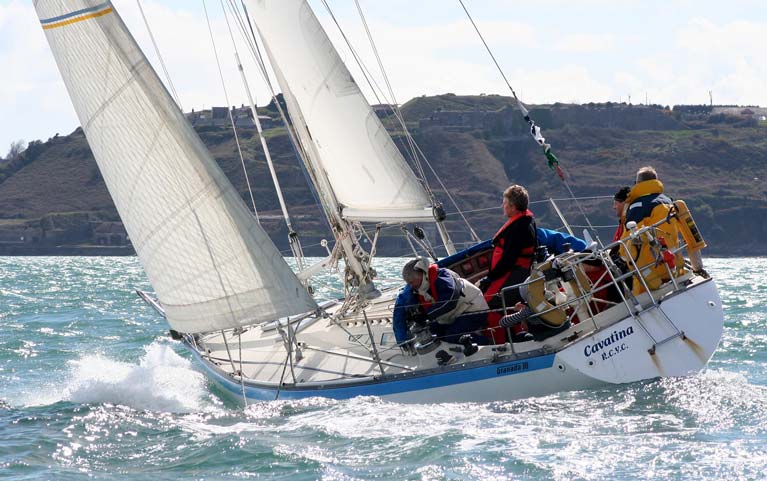 The all-conquering Cavatina. Never assume you’ve beaten her in a Round Ireland Race until you see the official numbers published in their final form. Photo: Facebook
The all-conquering Cavatina. Never assume you’ve beaten her in a Round Ireland Race until you see the official numbers published in their final form. Photo: Facebook
It’s less well-remembered now that although Imp was away in 2004, George and his mates borrowed John Godkin’s Ron Humphreys-designed Sovereign 400 VSOP out of Kinsale, and under the name of McCarthy Motors they took on a heavy weather race with relish. Here again, they were right on target getting into the finish area, but the Wicklow flukiness did for them yet again, so as George said, the reality is that his only actual victory was won through a monumental gamble, but you had to be there to get the full flavour of him savouring this memory.
Maurice “Prof” O’Connell’s memories of the Round Ireland go back to 1994 when he first did the circuit with the O’Learys on the Lightwave 395 Irish Mist, and in those days of unmarked two-mile long salmon nets, he reckoned they invented the “jump-broach” technique of taking a spinnaker-setting boat clean over a net by going sideways on her ear, thus preventing fouling of keel, rudder and propellor
Mark Mansfield reckons he made the same useful discovery when racing round in an X372 a couple of years earlier, but with salmon fishing regulation more severe these days, it’s a skill which is now vaguely recalled rather than actively practised.
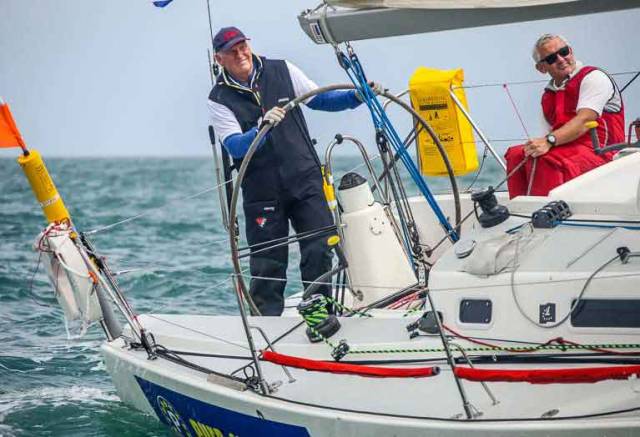 Mark Mansfield and Maurice “Prof” O’Connell racing Dave Culllen’s J/109 Euro Car parks in the early stages of the 2016 Round Ireland race, in which they secured a class win. Both lay claim to having invented the “broach-leap” to carry a spinnaker-setting boat clean across a salmon net. Photo: Afloat.ie/David O’Brien
Mark Mansfield and Maurice “Prof” O’Connell racing Dave Culllen’s J/109 Euro Car parks in the early stages of the 2016 Round Ireland race, in which they secured a class win. Both lay claim to having invented the “broach-leap” to carry a spinnaker-setting boat clean across a salmon net. Photo: Afloat.ie/David O’Brien
As it happens, The Prof reckons that expecting to carry experience from one round Ireland through to the next race two years later - and the races after that - is a snare and a delusion. For as he firmly declared, each race is ABSOLUTEY different from the previous one, and the conditions he and his shipmates’ experienced in winning their class with the J/109 Euro Car Parks in 2016 were pretty much the direct opposite of those they dealt with in getting another class win with the J/122 Aurelia in 2018.
With so much Cork input going into the discussion, it was a relief to find that Anna Walsh is a Dub, even though the inevitable Cork connections emerged on her mother’s side. She’s finding time again for offshore racing despite the challenges of raising a family and an extremely demanding and multi-faceted day job.
Thus she frankly admitted that while she was well able for most crewing job on an offshore racer, she got special satisfaction from being the ship’s cook, as it was a very focused function which took her mind off the distracting “trivia” of everyday life.
This column’s view is that while good helms are ten-a-penny, an able and talented ship’s cook is a treasure beyond price to be cherished in every way, his or her views held in reverence way above those of other crew members,
 Anna Walsh - she was on a crew of Peter Wilson’s J/35 Bridgestone when they were overall winners of the 1994 race
Anna Walsh - she was on a crew of Peter Wilson’s J/35 Bridgestone when they were overall winners of the 1994 race
That said, in this era of gender equality in all roles it didn’t seem quite right that the woman’s input to the discussion should be mostly on sea cooking, but Anna swept such notions aside with her enthusiasm and even followed up with a businesslike note on catering for the Round Ireland Race which is probably of more value than all of the rest of this blog put together, and here it is:
THE ANNA WALSH GOOD FOOD GUIDE FOR RACING ROUND IRELAND:
- There's the obvious stuff: checking crew allergens, avoiding poultry and dairy products that won't keep well, minimising strong flavours as the crew are living in too close quarters for days on end.
- There's the practical stuff: Planning a balanced and varied menu, meal by meal, day by day. Pre-cooking, vac-packing and labelling everything with indelible markers. And vac-packing the daily supplies that need to stay dry until day 4, 5 and 6 of the Race means you'll have dry matches, sugar cubes, toilet paper and tea bags when you need them most.
- The pressure cooker is your friend: Pre-cooked and vac-packed meals, including breakfasts, can be quickly and safely reheated in a pressure cooker in any conditions.
- Memorable meals: Be inventive with limited ingredients and stove-top cooking. Steak sandwiches can be cooked and served rounding the Tuskar if the prep has been done before the start. Ready to heat and serve stews with roast vegetables work well sailing up the West coast, especially in heavy weather. A hot bacon in eggy-bread sandwich passing Mew Island eaten on the rail of Jumpin' Jack Flash/Bridgestone was one of the most delicious Round Ireland meals ever.
- Secret recipe: Storm cake: Traditional fruit cake and Irish whiskey in roughly equal measures - lifts spirits during night watches.
Nourished by the very thought of all that, the gathering then went from seminar to party. One story which inevitably an rightly came up in Wednesday night’s general chat is an episode from the 2018 race which didn’t really get the publicity it deserved at the time. Aboard the INSS’s J/109 Jedi – chartered by Michael Boyd – they’d a dead-of-night man overboard emergency while plugging into the vicious headwinds off the north Kerry coast. Yet Kenneth Rumball master-minded the retrieval of the casualty with such skill and speed that the report of the incident went through in the race’s news-stream in a matter-of-fact style with so little fanfare that it was almost forgotten by the finish, but happily in November 2018 it was to be deservedly high-lighted with the award of the RORC Seamanship Trophy.
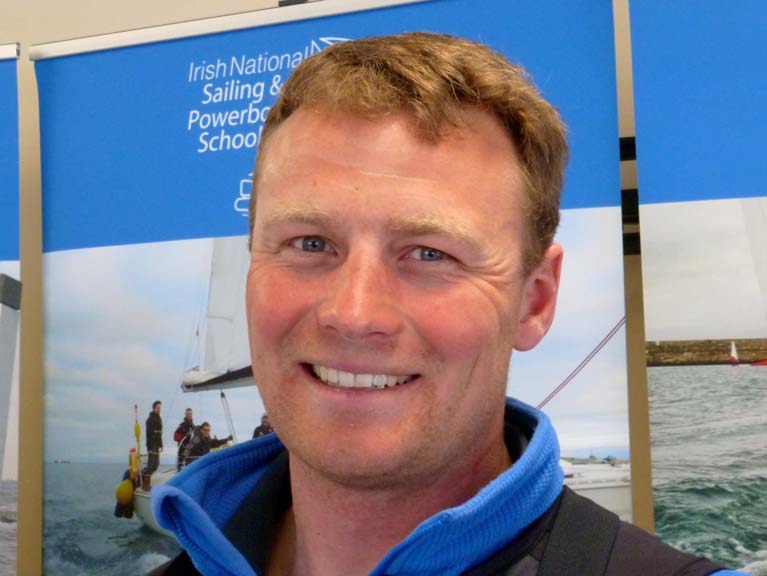 Kenneth Rumball of Irish National Sailing School, winner with Michael Boyd of the RORC Seamanship Trophy after a textbook man-overboard retrieval during 2018’s race. For 2020’s race, he is expected to be campaigning an entry of very special interest in the Two Handed Division. Photo: W M Nixon
Kenneth Rumball of Irish National Sailing School, winner with Michael Boyd of the RORC Seamanship Trophy after a textbook man-overboard retrieval during 2018’s race. For 2020’s race, he is expected to be campaigning an entry of very special interest in the Two Handed Division. Photo: W M Nixon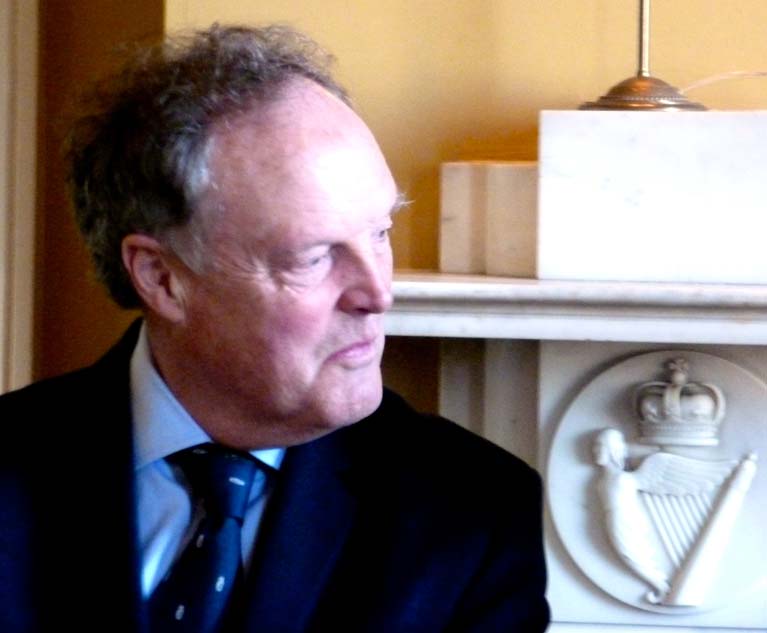 The inscrutable Michael Boyd, former Commodore of the RORC, in his home club of the RIYC. His plans for the 2020 Round Ireland race are still being kept under wraps. Photo: W M Nixon
The inscrutable Michael Boyd, former Commodore of the RORC, in his home club of the RIYC. His plans for the 2020 Round Ireland race are still being kept under wraps. Photo: W M Nixon
Michael Boyd’s plans for the 2020 race are still being kept under wraps, but you’d be unlikely to lose money if you made a modest wager that he’ll be on the starting line in some interesting boat. And as for Kenneth Rumball, if – as is very likely – he is there, it will be in a different boat in a new category which will be filling the sailing news in the very near future.
The boat he’ll race will be white-hot new, so there’s no way he’ll be eligible for another of the trophies which emerged from Wednesday’s virtual launching party, the Maybird Mast for the oldest boat to complete the course. The brainchild of Darryl Hughes whose immaculately-restored 1937 43ft Tyrrell of Arklow gaff ketch Maybird became both the first gaff-rigged boat and the oldest ever to finish the race was virtually presented to the organisers by the Dublin Bay Old Gaffers Association President Johnny Wedick at Wednesday’s cyberspace gathering, and will simply be for the oldest boat to finish.
There was an extraordinary linking of past and present as the DBOGA group included Lucia Hawkes-Bowen who’d come across from England, and she’s the great-niece of Col WCW Hawkes who was originally from Croshaven but was Cornwall-based when he had Maybird built by Jack Tyrrell in 1937.
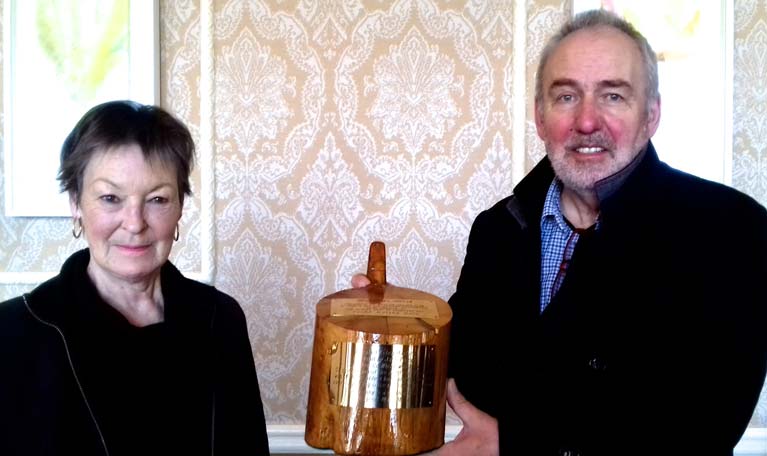 Lucia Hawkes-Bowen, great-niece of the original 1937 owner of the Tyrrell gaff ketch Maybird, with Darryl Hughes and the new Maybird Mast Trophy for the oldest boat to complete the Round Ireland Race
Lucia Hawkes-Bowen, great-niece of the original 1937 owner of the Tyrrell gaff ketch Maybird, with Darryl Hughes and the new Maybird Mast Trophy for the oldest boat to complete the Round Ireland Race
As for who is likely to be the first winner of the Maybird Mast Trophy, a sensible wager on the current entry list of 38 boats would be the American entry Hiro Maru (Hiro Nakajima) which came from behind to win Class 3 in last year’s Transatlantic race. Originally built as Scaramouche in 1971, she’s a Sparkman & Stephens 49 classic from the legendary alloy-building facility of Palmer Johnson in Wisconsin (the same design-build combo produced Ted Turner’s storm-tossed 1979 Fastnet winner Tenacious), and carries her 49 years with aplomb.
Next in line in age terms is the mid-1970s Noray 38 Cavatina (Ian Hickey, RCYC) which is also of course always in the reckoning for the overall win – she’s just that kind of boat and crew. The Dubois-design Fulmar 32 Fulmar Fever from Dunmore East Sea School might be though to be in the reckoning for ‘golden oldie’ prize, but in fact they didn’t start building this marque until 1979, so her main competition will be for the Sailing Schools award, where she’ll be up against two entries from Ronan O’Siochru’s Irish Offshore Sailing. Both are vintage Sun Fast 37s, and one of them – Desert Star – won the Roger Justice Trophy for Sea Schools in the 2015 Rolex Fastnet race.
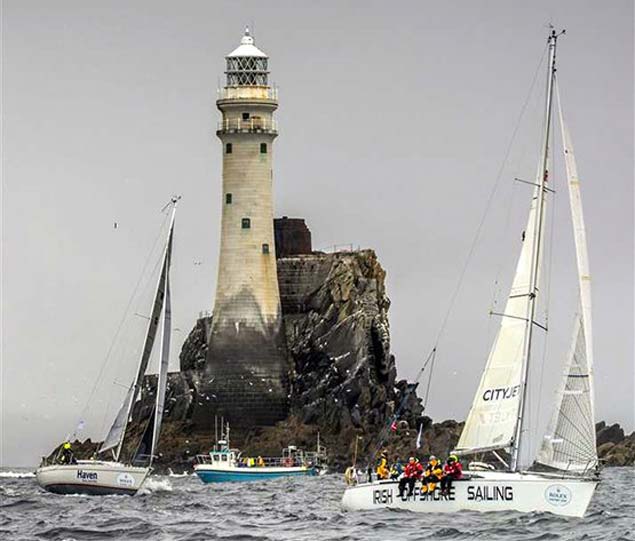 Desert Star, skippered by Ronan O Siochru of Irish Offshore Sailing, on her way to winning the Roger Justice Trophy in the 2015 Fastnet Race
Desert Star, skippered by Ronan O Siochru of Irish Offshore Sailing, on her way to winning the Roger Justice Trophy in the 2015 Fastnet Race
The top Irish boat from the 2019 Fastnet – Conor Doyle’s Xp 50 Freya from Kinsale – is down to race round Ireland, as is the Murphy family’s successful Grand Soleil 40 Nieulargo from Royal Cork along with clubmate Frank Doyle in his J/112E Cara, so there’s a notably strong representation from Cork of boats which will probably then position themselves to race home via the re-enactment of the 1860 Dublin Bay to Cork Harbour Race early in July - probably the oldest offshore race in Britain and Ireland, but that’s a topic we’ll return to at a later date.
Meanwhile, the SSE Renewables Round Ireland Race from Wicklow on June 20th, with entries from eight countries, is still scheduled to go ahead on time as we write, and the really notable thing about it is the already strong international entry, something which is equalled only by the number of rumours about significant entries which have yet to throw their hats into the ring.
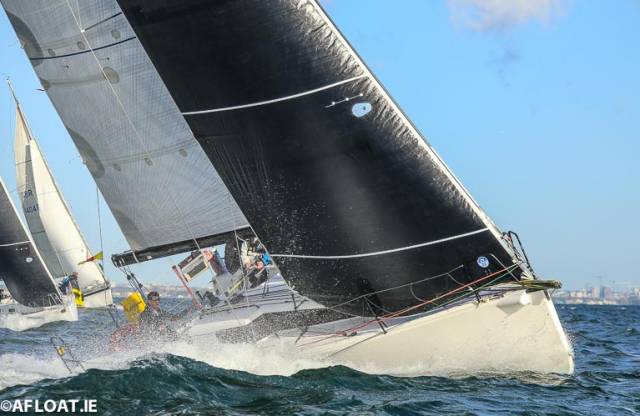 Raring to go – Paul O’Higgins’ JPK 10.80 Rockabill. Photo: Afloat.ie/David O'Brien
Raring to go – Paul O’Higgins’ JPK 10.80 Rockabill. Photo: Afloat.ie/David O'Brien
Paul O’Higgins (RIYC) is of course firmly in place for his third attempt at the top title with his JPK 11.80 Rockabill VI, which has won just about everything else, but the remarkable JPK Dream Factory in Lorient has been busy, and he’ll find himself up against a newer JPK, in this case the 11.80 Fastwave 6 campaigned by France’s Eric Fries.
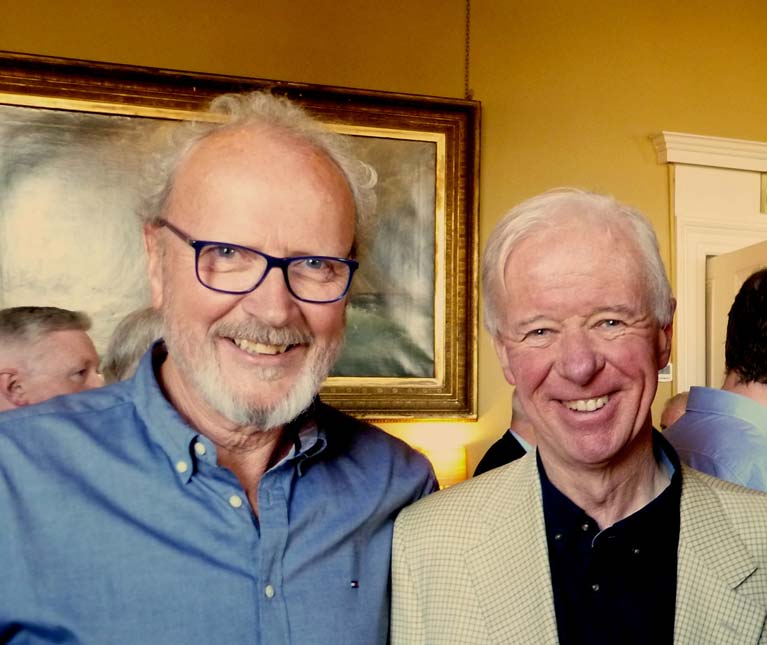 Peter Wilson, overall winner in 1994 with the J/35 Bridgestone, and a key skipper and crewmember in many other major race wins, with Paul O’Higgins. Photo: W M Nixon
Peter Wilson, overall winner in 1994 with the J/35 Bridgestone, and a key skipper and crewmember in many other major race wins, with Paul O’Higgins. Photo: W M Nixon
And it seems certain there’ll be an even newer JPK 10.30 in the final lineup, and if it turns out to be Jean-Pierre Kelbert himself in his all-conquering Leon, it wouldn’t surprise us for a minute. After a virtual launching party to soar over the problems of the Covid-19 lockdown, anything is possible for the 21st Round Ireland Race.
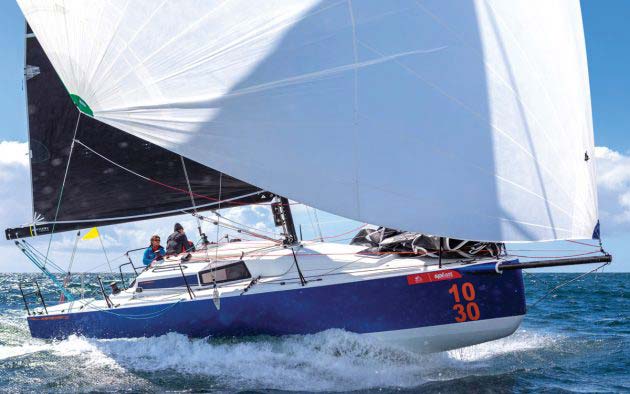 Bolt from the blue – the hyper-successful new JPK 10.30 Leon may well be in the Round Ireland mix
Bolt from the blue – the hyper-successful new JPK 10.30 Leon may well be in the Round Ireland mix
Wednesday's launch of the SSE Renewables Round Ireland Yacht Race at the Royal Irish Yacht Club on Dublin Bay has been postponed over increasing concern surrounding the transmission of Coronavirus.
Wicklow Sailing Club Commodore and Race Organiser Kyran O'Grady said: "We will continue to follow public health guidance and hope to reschedule".
The 21st edition of the offshore race has a buoyant entry to date recording 38 entries, prompting many to predict the June 20th start could be a record one.
Double Race winner, the vintage Granada 38 Cavatina is the 37th entry into this June's 21st edition of the 700-mile SSE Renewables Round Ireland Yacht Race.
Skipper Ian Hickey from the Royal Cork Yacht Club in Crosshaven completed his entry this week.
In a bid to be the first boat to win Ireland's classic offshore race three times, Hickey and his race-hardened crew will be aware they were also the overall leaders in the last race in 2018 when the low-rated boat reached the Donegal coast only then for the race to pan out in another way and drop Cavatina down the leaderboard to sixth.
It is the second Royal Cork Yacht Club entry into the circuit in a week. Denis and Annamarie Murphy's well-proven Italian marque, the Grand Soleil 40 Nieulargo, is also signed up for the race in just over 15 weeks time. Nieulargo is a force to be reckoned (especially in a breeze) and was the winner of RCYC's Yacht of the Year in 2018.
Royal Cork Yacht Club's Grand Soleil 40 Nieulargo is the latest entry into this June's SSE Renewables Round Ireland Yacht Race from Wicklow that gets underway in just over 15 weeks time.
Denis and Annamarie Murphy's well-proven Italian marque has been a force to be reckoned with on the south coast (especially in a breeze) and was the winner of RCYC's Yacht of the Year in 2018.
And it's not the first foray offshore for the Murphy family's most successful all-rounders as they were entrants in last year's Dun Laoghaire Dingle Race too.
Nieulargo brings to 34 the number of entries so far for the Round Ireland that is attracting considerable international interest this year. Wicklow organisers are aiming for a 60-boat fleet and with 15 weeks to go, and entries running typically very late there is still every chance this will be met for its 21st edition.
One of those skippers yet to declare is the weekend Class One winner of the RORC Caribbean Race. Royal Irish skipper Michael Boyd leads the race for a Volvo Car prize in this year's Race but only three points separate the top four skippers overall and the RIYC man has yet to reveal his boat of choice for the 700-miler.
Round Ireland Yacht Race Man Overboard Recovery (Lecture Video)
It was about 1 am off the coast of County Kerry when John White came off the helm of Jedi, a J109, competing in the 2018 Round Ireland Yacht Race. Facing 30-knots on the nose and three to four metre seas, as White moved forward, a large wave crashed over the boat, knocking him overboard.
White joined helmsman Kenneth Rumball to share their learnings from the successful recovery of John, a fate that lead to Kenneth being awarded the RORC Seamanship Trophy.
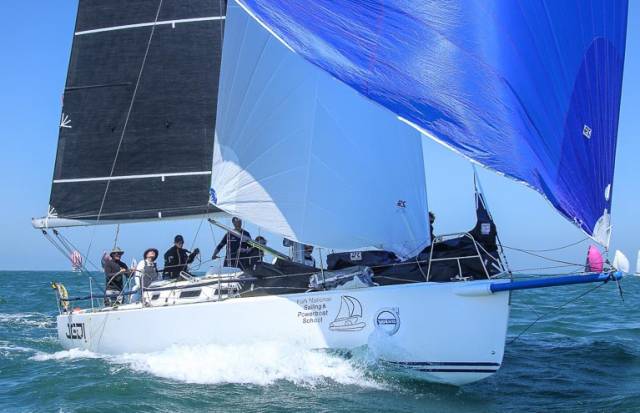 The INSS Jedi competing in the 2018 Round Ireland Race. Photo: Afloat.ie
The INSS Jedi competing in the 2018 Round Ireland Race. Photo: Afloat.ie
Both describe in detail the key points they think lead to the successful recovery of John, proper preparation, pre-sailing drills, sufficient training for all the crew and ultimately having the right gear, as well as knowing how to use it.
White describes the surreal experience of being away from the boat, and the exemplary Seamanship exploits undertaken to retrieve him safely, and indeed get back racing. Rumball shares his experiences as Skipper but emphasises how the training he provides in the day job as chief instructor at the Irish National Sailing & Powerboat School kicked in. A frank and sobering discussion on the good fortune it was to correctly install AIS MOB devices, ensure that everyone had the latest lifesaving kit is undertaken.
This is a must-watch for any skipper or crew member who races offshore but would appeal to a wider audience with an interest in yachting as John and Kenneth recant the compelling story, which thankfully had a happy outcome.
The video (above) is divided into chapters as follows:
- Preparation - 2 mins 30 seconds
- Build Up - 14 mins 20 seconds
- Man Overboard - 20 mins 20 second
- The water - 30mins 20 seconds
- Gear - 34 mins 40 seconds
- Recovery - 51 mins 00 seconds
- Rest of the Race - 1 hour 10 mins 40 seconds
Round Ireland Yacht Race Entries Already Going Big On Size & Variety
It may be only mid-February, but entries for the 704-mile 40th Anniversary 21st edition SSE Renewables Round Ireland Yacht Race from Wicklow on June 20th are already on the two dozen mark, and the fleet is remarkable for its variety of size and type, writes WM Nixon.
In an initial lineup which has 15 boats from outside Ireland, the most exotic has to be Neptune 3 from Malta, the 26-metre alloy Fitzroy cutter (with Judel Vrolik input) which is skippered by Greg Miller.
Another biggie is the former Volvo 70, Telefonica Black, while smallest is the First 310 More Mischief, just 9.15 metres long and entered by Grzegorz Kalinecki of Dun Laoghaire. At the moment there’s only one J/109, Outrajeous from Howth entered by Johnny Murphy, who co-owns her with ICRA Commodore Richard Colwell, but doubtless others of this famous marque will throw their hat into the ring in due course.
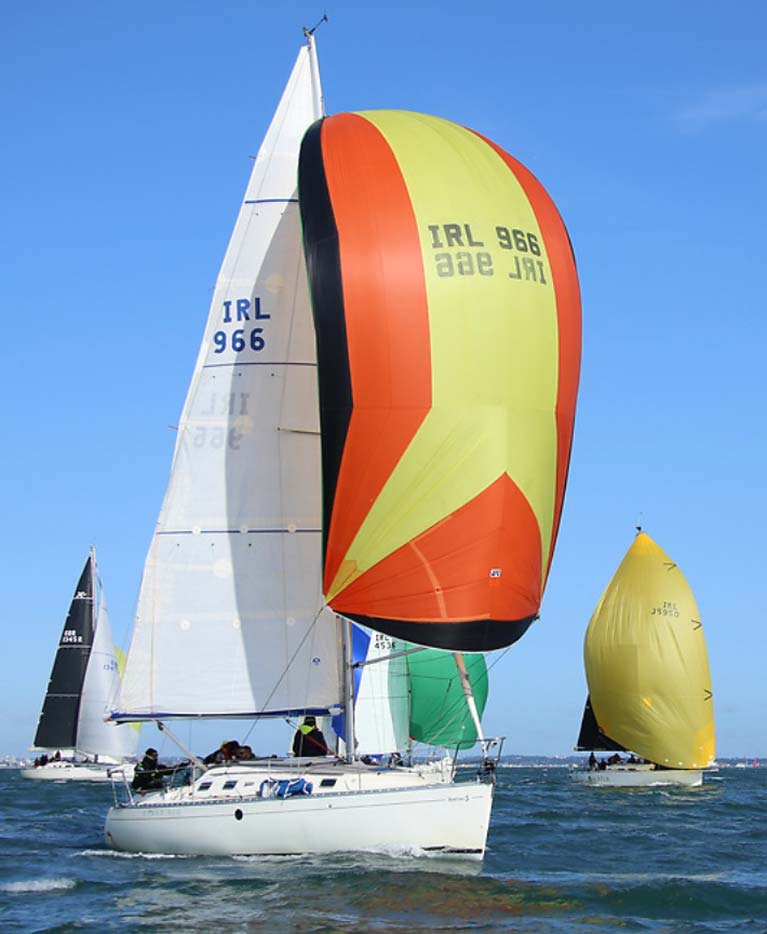 The First 310 More Mischief from Dun Laoghaire is currently the smallest entrant. Photo: Afloat.ie/David O’Brien
The First 310 More Mischief from Dun Laoghaire is currently the smallest entrant. Photo: Afloat.ie/David O’Brien
Paul O’Higgins’ otherwise all-conquering JPK 10.80 Rockabill VI (RIYC) is down to go for her third campaign in a circuit where victory has eluded her so persistently - despite conspicuous successes in every other offshore competition - that it’s all beginning to be reminiscent of Saoirse Ronan and the Oscars……
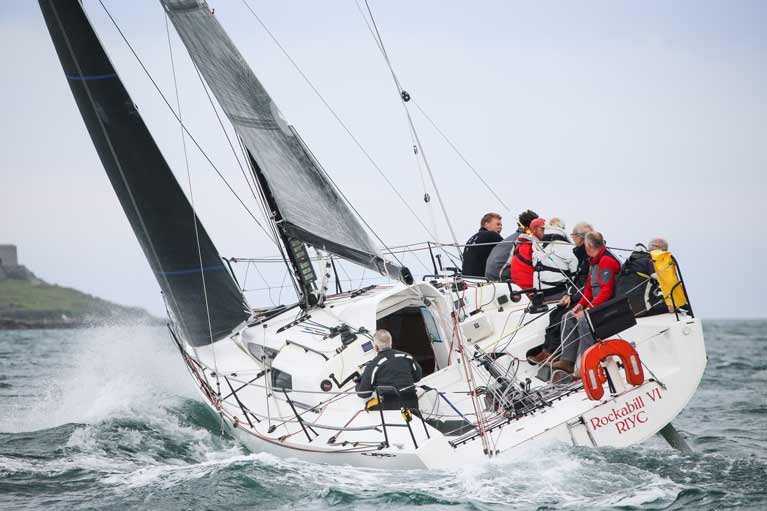 The Saoirse Ronan of Irish offshore racing? Paul O’Higgins’ otherwise all-conquering JPK 10.80 Rockabill VI (twice winner of the Dun Laoghaire-Dingle Race) is entered for her third Round Ireland challenge, despite success eluding her in 2018 and 2016 when she seemed to win everything else on the offshore circuit. Photo: Afloat.ie/David O’Brien
The Saoirse Ronan of Irish offshore racing? Paul O’Higgins’ otherwise all-conquering JPK 10.80 Rockabill VI (twice winner of the Dun Laoghaire-Dingle Race) is entered for her third Round Ireland challenge, despite success eluding her in 2018 and 2016 when she seemed to win everything else on the offshore circuit. Photo: Afloat.ie/David O’Brien
International Interest as Wicklow’s Round Ireland Race Comes of Age
This year, with the fresh sponsorship of SSE Renewables, the Round Ireland Race from Wicklow comes of age. The 21st staging of the biennial classic – now an international event, included in the Royal Ocean Racing Club’s programme and an integral part of its annual points championship – will mark four decades of exceptional enthusiasm and voluntary dedication by a relatively small sailing club in a little river mouth port, a harbour town which successfully asserts its special position and unique identity in an Irish sailing scene which otherwise tends to be dominated by four or five much larger sailing centres.
Although the entry process for 2020’s race on June 20th was only opened as recently as January 20th, confirmed entries are already pushing towards the 20 mark, and while the latest entry is the Xp44 WOW (George Sisk) from the Royal Irish YC in Dun Laoghaire, a notable feature of the early entries is their overseas range, including Hiroshi Nakajima’s classic Sparkman & Stephens 49 Hiro Maru, from the US, campaigning in Europe after last year’s Transatlantic Race.
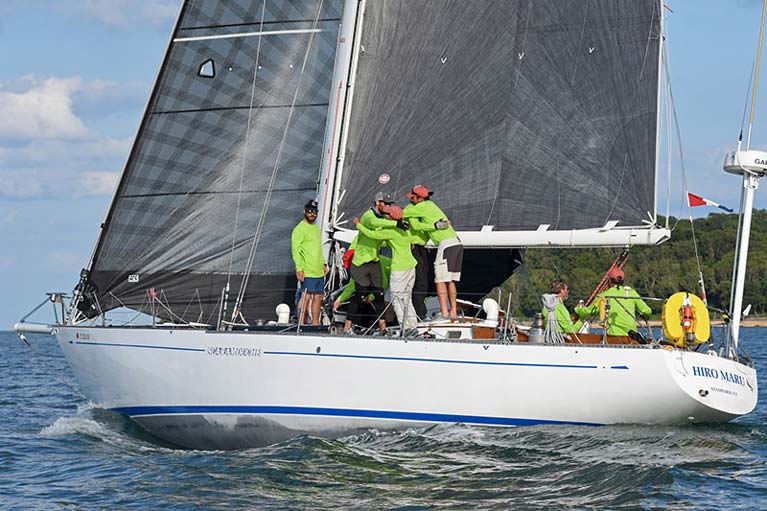 An American entry already in for the SSE Renewables Round Ireland Race 2020 is Hiroshi Nakajima’s 1971-vintage S&S 49 classic Hiro Maru, built-in aluminium by Palmer Johnson of Sturgeon Bay, Wisconsin, the builders of Ted Turner’s 1979 Fastnet Race winner Tenacious
An American entry already in for the SSE Renewables Round Ireland Race 2020 is Hiroshi Nakajima’s 1971-vintage S&S 49 classic Hiro Maru, built-in aluminium by Palmer Johnson of Sturgeon Bay, Wisconsin, the builders of Ted Turner’s 1979 Fastnet Race winner Tenacious
This international interest has been a central theme of the Round Ireland Race from its early days, and in some years such as 2016 when George David’s mighty mono-hull Rambler 88 and three MOD 70 trimarans established a complete raft of new records, it has been the dominant feature. But equally, for many offshore racers from clubs all round Ireland and further afield, racing round Ireland is a rite of passage, so special for some that they do it many times.
But at whatever level you participate, in whatever size of boat, there is something profound, something unique and deeply satisfying, about racing round our island home, experiencing its incredibly varied weather, its majestic coastline, its wayward tides, and the camaraderie which develops among competitors, whether as shipmates or friendly rivals. And with this 21st staging of the race, it is time to put the story in context.
Forty years ago on Saturday 28th June 1980, a varied fleet of 13 small to medium-sized cruiser-racers came to the starting line off Wicklow, and headed south with the gathering ebb tide and a summery easterly breeze in the first non-stop Round Ireland Race, a challenge which - at 704 miles – was just four miles short of being a hundred miles longer than the standard-setting Fastnet Race itself.
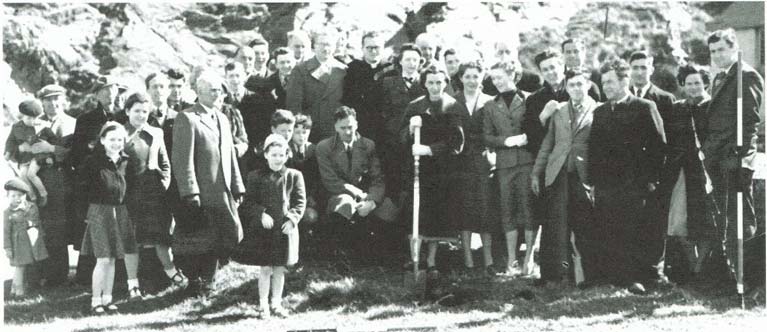 Beginnings – the ceremony to turn the first sod for the building of a clubhouse for the new Wicklow Sailing Club in 1953
Beginnings – the ceremony to turn the first sod for the building of a clubhouse for the new Wicklow Sailing Club in 1953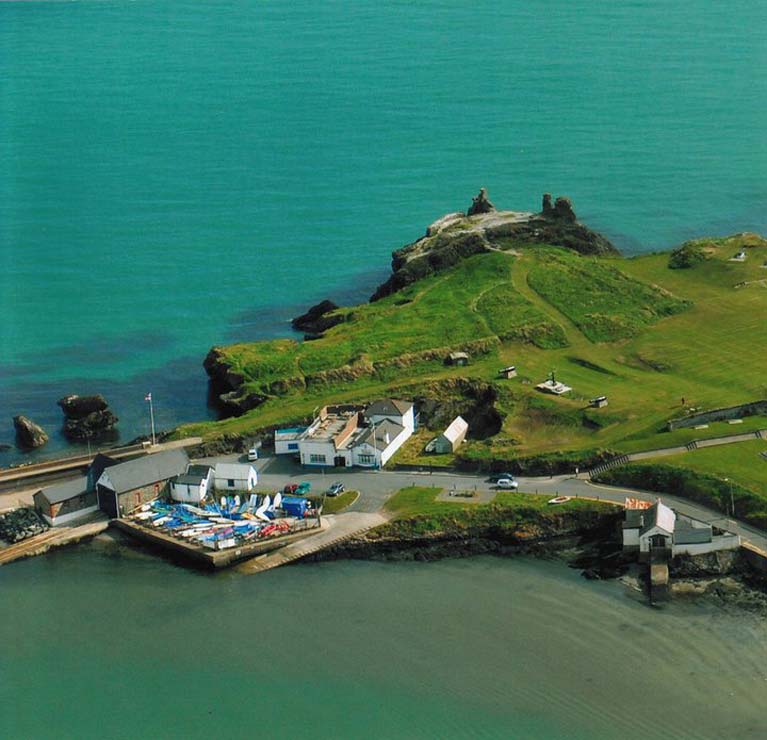 Small club, big heart – Wicklow SC (centre) and the Wicklow RNLI Station (left) provide a maritime hotspot at the head of the pier
Small club, big heart – Wicklow SC (centre) and the Wicklow RNLI Station (left) provide a maritime hotspot at the head of the pier
The organising Wicklow Sailing Club – founded as recently as 1950/51 - may have been small by comparison with many of the older history-laden Irish yacht clubs. But with a strong voluntary spirit, it punched well above its weight in being at the heart of a community in which it promoted sailing and waterfront co-operation in a picturesque but workaday port, a harbour where the dominant activities had formerly been in meeting the needs of small cargo ships, a local inshore fishing industry, and a voluntarily-supported lifeboat station.
By the late 1970s the club was a hive of activity, and in 1979 - with Harry Jordan as Commodore - in addition, its own busy weekly races it was actively involved in bringing newcomers to sailing. That year, it also ran an innovative Wicklow Yacht Rally which drew in 46 participants from all around the Irish Sea. With its testing of crews’ skills and a programme of assessment and advice by recognized experts on preparing boats for serious sea-going, it was the core event in a summer fixtures list of such varied, useful and yet enjoyable activity that the newly inaugurated “Sailing Club of the Year” competition in 1979 selected Wicklow SC to be its first winner.
But even as the successes of 1979 were being celebrated, another game-changing idea was rapidly developing. Michael Jones, a keen member of the club who served as Commodore three times - in 1972, 1984 and 1991 - was also a longtime honorary secretary of the Wicklow RNLI. With an accountancy practice in the town, he was well aware of the place’s strengths and weaknesses.
Pondering on all this, he became convinced that a major maritime event was needed to help Wicklow re-discover its deeper maritime roots, assert its individuality as a self-contained and thriving community in the face of growing Dublin commuter encroachment, and generally make its mark on the national sailing stage.
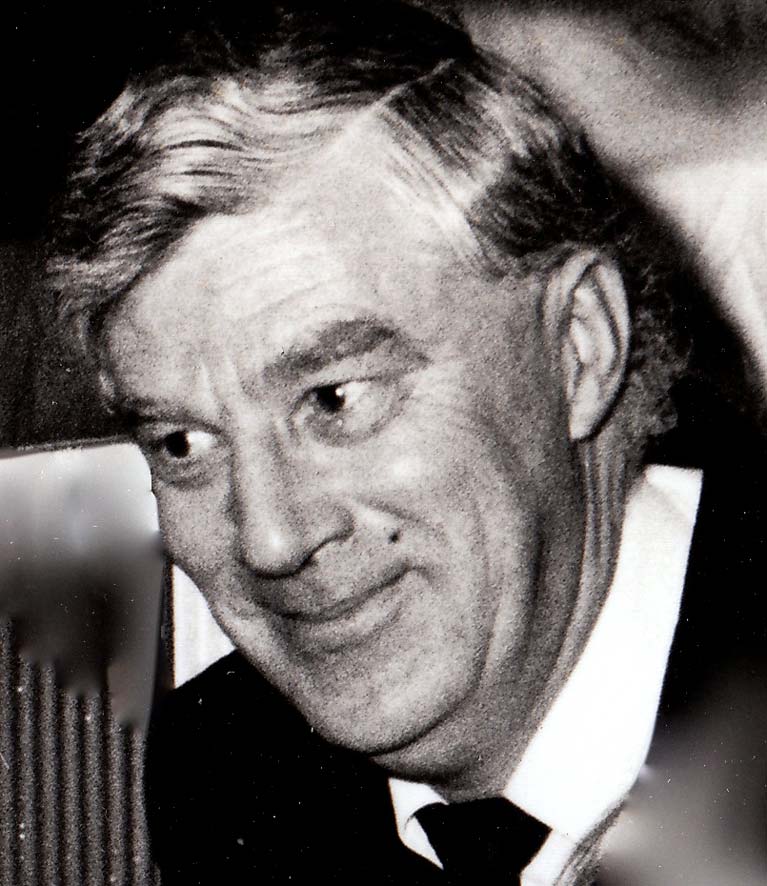 Man of vision – Michael Jones of Wicklow
Man of vision – Michael Jones of Wicklow
Or at least that’s the way he subsequently explained how he brought the Round Ireland Yacht Race starting and finishing at Wicklow into being. Whatever the reasons, he had the idea, indeed he was consumed by it. But instead of promoting it with noisy announcements, he put at least as much energy into behind-the-scenes networking with the kind of slightly off-the-wall offshore sailing enthusiasts who had emerged with the growth of the ISORA programme and other events, together with more cruising-oriented people whom he knew would feel that a non-stop round Ireland race was an event whose time had come.
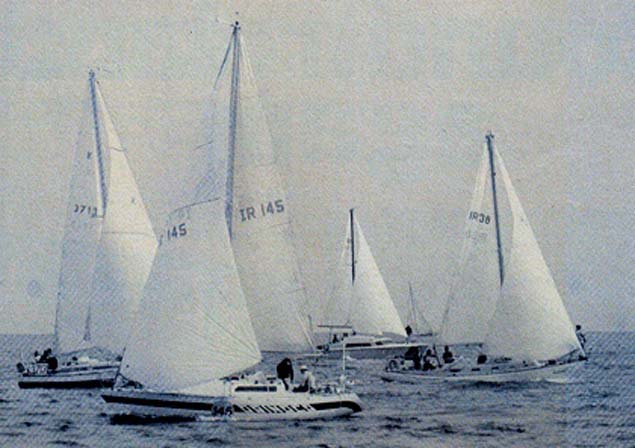 Pre-start manoeuvres at the inaugural Round Ireland 1980 with (left to right) line honours winner Force Tension, the Shamrock class Orinoco, John Hall’s Prout catamaran, and eventual overall winner Raasay of Melfort (Brian Coad). Photo: W M Nixon
Pre-start manoeuvres at the inaugural Round Ireland 1980 with (left to right) line honours winner Force Tension, the Shamrock class Orinoco, John Hall’s Prout catamaran, and eventual overall winner Raasay of Melfort (Brian Coad). Photo: W M Nixon
At the same time, he brought key members of Wicklow Sailing Club who had shown their readiness for voluntary work along with him, and the fruits of their labour became evident on that summery Saturday afternoon off Wicklow on June 28th 1980 when 13 boats went off southwards in an easterly breeze after a rather uneven start. It was uneven because this was the first time a Round Ireland fleet became aware that the sluicing ebb off the Wicklow pierheads makes an early arrival on the line a loser’s option.
Thus although top skipper Johnny Morris of Pwllheli with Tony Vernon’s High Tension 36 Force Tension was so neatly away that his boat doesn’t appear in any of the photos of the main group starting, Half Ton ace Jim Poole of the National Yacht Club with his Ron Holland-designed Feanor almost found himself on the wrong side of the Committee Boat in that tide, and had to assert his rights on starboard gybe to make the line.
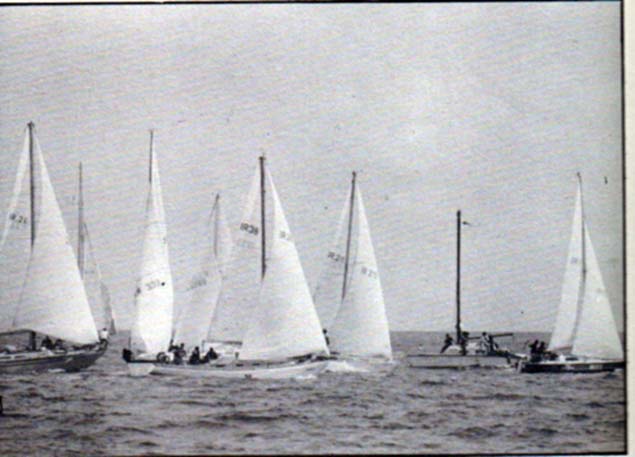 That first start in 1980 – Force Tension is already out of picture, Brian Murphy’s Hydra class Crazy Jane is next across ahead of Raasay, and Feanor is having to assert her starboard gybe rights with Partizan after under-estimating the tidal stream. Photo: W M Nixon
That first start in 1980 – Force Tension is already out of picture, Brian Murphy’s Hydra class Crazy Jane is next across ahead of Raasay, and Feanor is having to assert her starboard gybe rights with Partizan after under-estimating the tidal stream. Photo: W M Nixon
Yet in the end, although Force Tension took line honours by more than two hours from Dave FitzGerald’s Holman & Pye 41 Partizan from Galway, it was the little Feanor (whose crew included a young Enda O Coineen) which won IOR overall by an hour from Dermod Ryan’s Hustler 35 Red Velvet (RStGYC).
But when the idea of the race had been launched, Michael Jones had no idea of just how much it would appeal to an all-Ireland cross-section of established offshore racers. So, to spread the net wide, he announced from the get-go that the ultimate winner would be based not on the very competitively-oriented International Offshore Rule, but on a special Wicklow Round Ireland Handicap, and multi-hulls would also be welcome to take part.
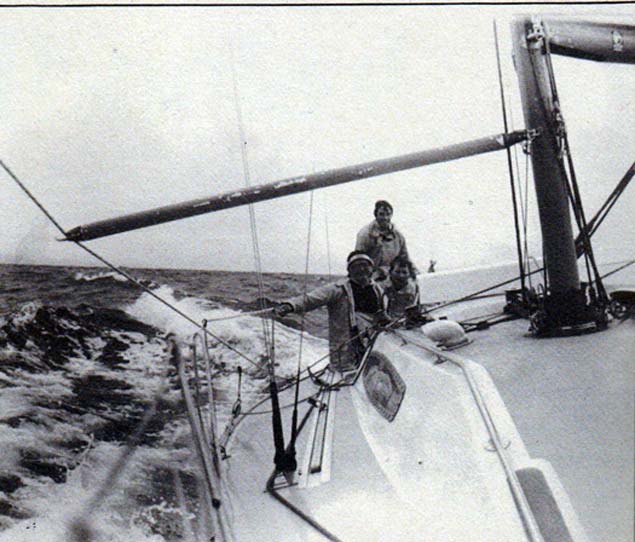 Making knots in the open Atlantic - the Half Tonner Feanor running smoothly off the west coast. Photo: Enda O Coineen
Making knots in the open Atlantic - the Half Tonner Feanor running smoothly off the west coast. Photo: Enda O Coineen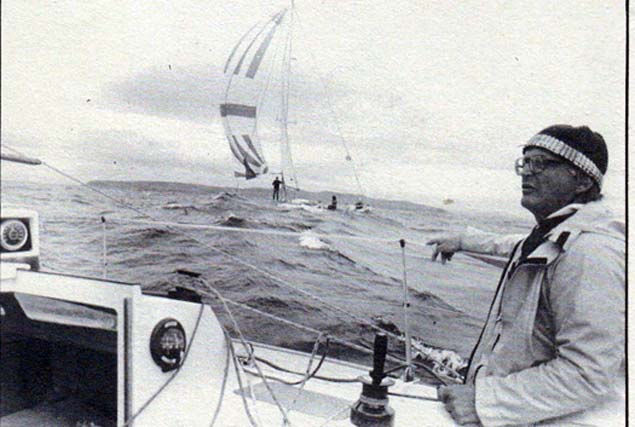 Chasing the big ’uns – Feanor with the 41ft Partizan (Dave Fitzgerald) off the coast of Donegal in 1980. Photo: Enda O Coineen
Chasing the big ’uns – Feanor with the 41ft Partizan (Dave Fitzgerald) off the coast of Donegal in 1980. Photo: Enda O Coineen
Thus the first winner was definitely a boat with strong cruising emphasis, Brian Coad’s Rival 34 Raasay of Melfort from Dunmore East. And though none of the multihulls finished, one of their skippers, John Hall of the National YC, is the only skipper from that race of 1980 still actively campaigning, though for some years now he has been doing it in partnership with his son Brian in the J/109 Something Else.
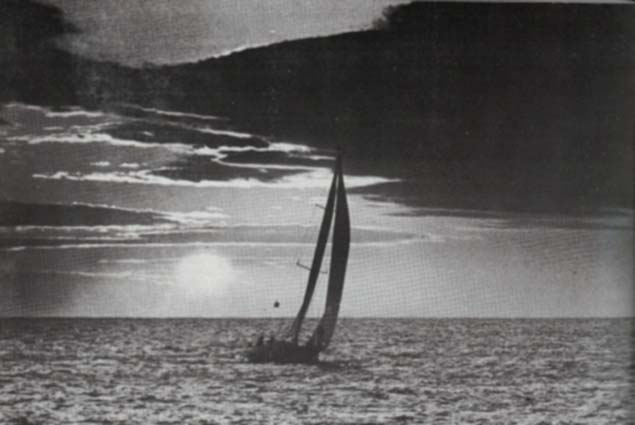 Classic finish to the first Round Ireland Race – Dave Fitzgerald’s Partizan from Galway come out of the dawn to the finish at Wicklow in 1980 to take second in line honours
Classic finish to the first Round Ireland Race – Dave Fitzgerald’s Partizan from Galway come out of the dawn to the finish at Wicklow in 1980 to take second in line honours
Either way, the race was well launched, and signs of addiction to this glorious course were well in evidence among some of the first time participants. So there was no question but that the race would be sailed again in 1982, and this time Michael Jones and his team in Wicklow SC really hit the jackpot - The Doyler came up from Crosshaven to take part with his already-legendary new Frers-designed 51ft Moonduster.
Denis Doyle and Moonduster epitomised the very spirit of Irish offshore racing, going back in a direct line to the Gull in the first Fastnet Race of 1925 with skipper Harry Donegan. Needless to say, in the time-honoured Cork sailing tradition the Doyle and Donegan families were related through marriage. Like Harry Donegan, Denis Doyle fully realised what a significant role a major sailing event could play in the economy of a small seaport town. So in Wicklow, Moonduster’s skipper and his ever-supportive wife Mary stayed near the harbour in a guesthouse in the town in the days beforehand to indicate their complete commitment to a Wicklow-based Round Ireland Yacht Race, a supportive habit they continued throughout Moonduster’s many years of racing round Ireland.
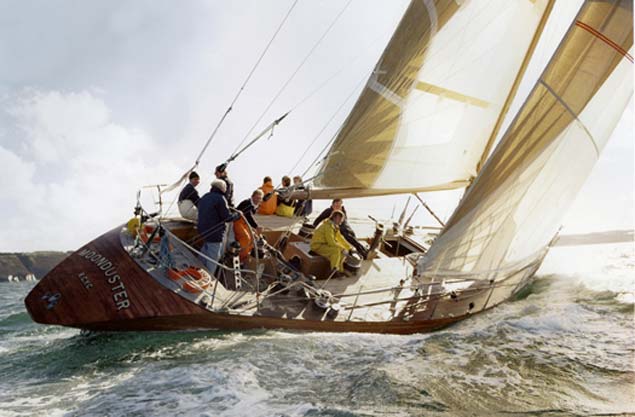 Denis Doyle helming his beloved Moonduster. His complete commitment to the Round Ireland Race as a Wicklow event from 1982 onwards played a key role in establishing the race’s success. Photo: Bob Bateman
Denis Doyle helming his beloved Moonduster. His complete commitment to the Round Ireland Race as a Wicklow event from 1982 onwards played a key role in establishing the race’s success. Photo: Bob Bateman
As a former Flag Officer of the Royal Ocean Racing Club, Moonduster’s skipper brought an element of RORC support to the event, particularly as regards pre-race scrutineering. This was very timely for the 1982 circuit, as it was a race of heavy weather with north to northeast gales making things brutal. Many boats sought shelter along the west coast, and even Moonduster had to pause for a while close under the limited shelter of Malin Head while a crewman went aloft to replace a broken halyard.
Despite that, she got round in 4 days 3 hrs 45mins and 25 seconds, taking line honours and eventually the overall win despite the slowly-changing wind direction theoretically favouring the smaller boats. As for the race’s status, it was now fully established in the offshore calendar in its convenient position in non-Fastnet years, with Moonduster becoming a round Ireland regular until Denis Doyle’s death in 2001.
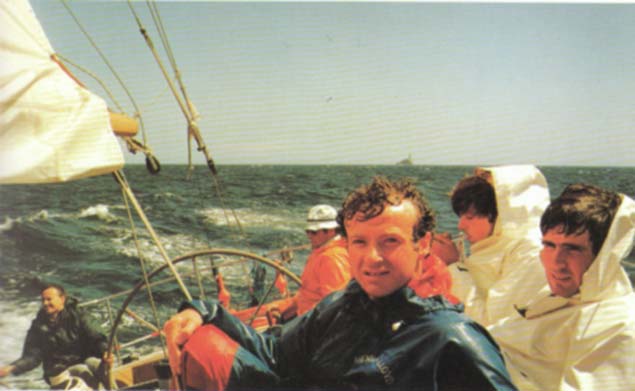 Neil Hegarty at the helm as Moonduster puts the Fastnet Rock rapidly astern in 1984’s record race – “we were seeing off an entire Irish county in every watch”.
Neil Hegarty at the helm as Moonduster puts the Fastnet Rock rapidly astern in 1984’s record race – “we were seeing off an entire Irish county in every watch”.
In 1984, The Duster had an astonishing race, with the wind favouring her at every headland such that, in the words of navigator John Bourke (who was himself later to become the RORC Commodore): “We were seeing off an entire Irish county in every watch”.
In 2020, forty years after that first tentative race, we’re looking at the 21st Round Ireland Race from Wicklow, and a bare tabulation of the winners over the years gives a hint of the many boats and hundreds – indeed thousands – of people who have been involved, people who in their most active offshore racing days defined this now-central feature of Irish sailing.
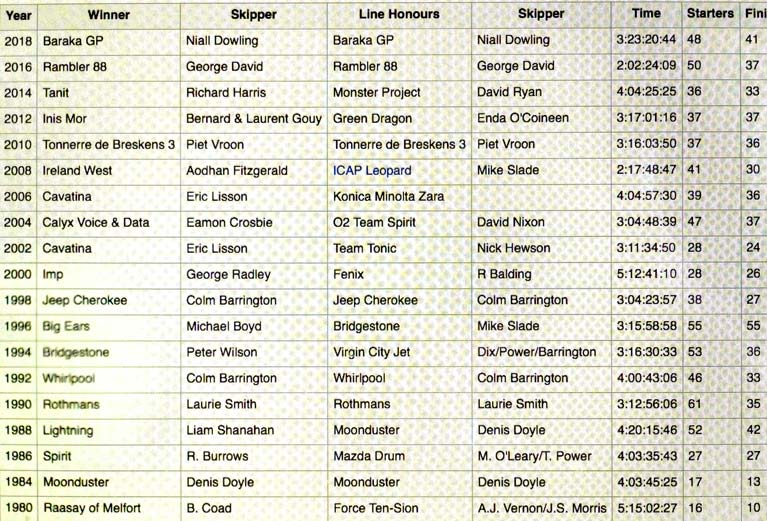 An almost-complete basic analysis – missing is 1982 when Moonduster took both line honours and the corrected time win, a feat she repeated in 1984.
An almost-complete basic analysis – missing is 1982 when Moonduster took both line honours and the corrected time win, a feat she repeated in 1984.
The stories behind this bare-bones list would fill several books and still leave out some choice stories. 1986 saw the race gain real muscle with major sponsorship from Cork Dry Gin, and in that year it was Irish Distillers own Richard Burrows himself who won (his crew including Robert Dix) sailing the Dehler db2s Spirit, while line honours were taken by the Ron Holland Maxi Drum, with owner Simon le Bon of Duran Duran on board.
The fact that all 27 starters finished reinforces memories of this as being one of the most summery races, but as Robert Dix on Spirit commented, “the summer haze was such that half the time we couldn’t see the magnificent coastlines which we knew we were racing along.
The special Dehler db2s got another look-in during 1988’s race, when Liam Shanahan’s Lightning (NYC) took the handicap win, while Moonduster had another bite at line honours. Those late 1980s were the last years in which tobacco and drink companies were still tolerated as sponsors for sports events. But the Health Police were closing in, and the Cork Dry Gin Round Ireland Race of 1990 was something of a last hurrah, as CDC’s generosity encouraged a starting line-up of 61 boats – it’s still the record turnout – and the line honours and overall winner was the legendary Lawrie Smith sailing the Maxi Rothmans and promoting Silk Cut cigarettes, his leading crew being the hyper-talented Gordon Maguire.
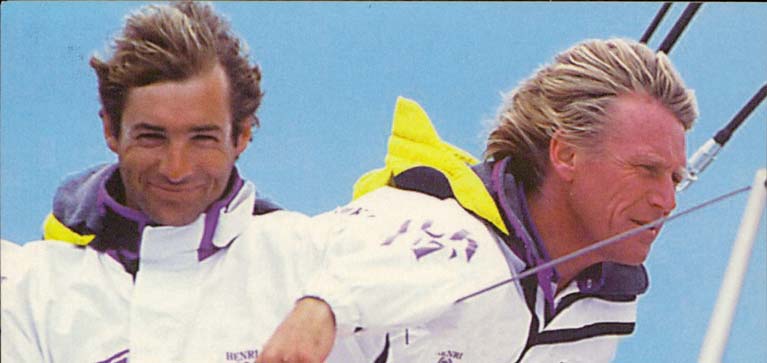 Dream team…Gordon Maguire and Lawrie Smith on the maxi Rothmans, with which they won line honours and overall in 1990’s race.
Dream team…Gordon Maguire and Lawrie Smith on the maxi Rothmans, with which they won line honours and overall in 1990’s race.
Yes indeed, boys and girls. Thirty years ago, ultra-healthy sports events such as the Round Ireland Race were being sponsored by booze companies and won by smokes, and only a few thought it all a bit odd. So the fact that for 2020 the new sponsor is a clean energy company which is hitting the optics spot on - and sending out all the right messages - tells us how far we’ve come in thirty years, even if in the end it is still the same rugged challenge of getting your boat round Ireland in a competitive timeframe.
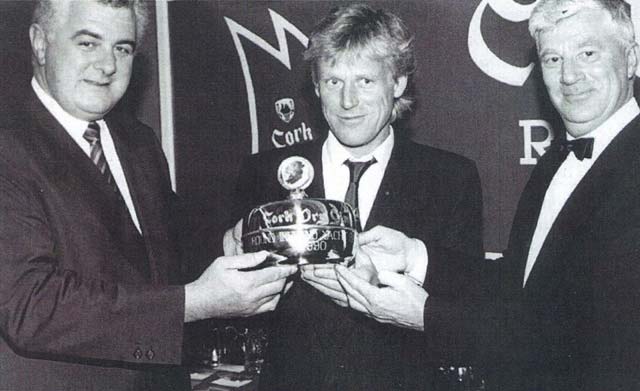 Richard Burrows (winner in 1986) with Lawrie Smith (winner in 1990) and Race Director Michael Jones
Richard Burrows (winner in 1986) with Lawrie Smith (winner in 1990) and Race Director Michael Jones
In fact, in looking at that list, you can deduce from comparing the number of finishers with the number of starters just how rough that particular race might have been, for if the race had been beset by calm, the high-rated boats tended to suffer but low-rated craft like Eric Lisson’s Noray 38 Cavatina from Cork – winner in 2002 and 2006 – knew they just had to keep plodding along and read the new wind correctly to take the honours.
If the 1980s were the era of the Dehler db2S marque, the 1990s marked high noon for the J/35. Not every boat from the generally successful J Boat range was always on the money, but even among the special ones the J/35 was very special indeed, and in 1994 (quite a stormy race) Peter Wilson of Howth won with the J/35 Bridgestone, while in the 1996 race it was the turn of a sister-ship, Big Ears from the RIYC skippered by future RORC Commodore Michael Boyd, which took the honours.
Michael Boyd’s dedication to racing round Ireland is quite something, as he’s still at it, and with good placings in the 2016 and 2018 races he is well in line for the three-race prize of a Volvo car, presumably one of the impressive new electric ones. But though the whispers for the 2020 strongly suggest a Boyd involvement, at the moment nothing is official.
Meanwhile, we could warble on for hours about what that list of winners and line honours holders tells us, but for now, we’ll be content with observing that the last truly Irish overall winner was Aodhan FitzGerald of Galway with the First 40.7 Ireland West in 2008, which is getting to be quite a long time ago.
Admittedly the most recent winner in 2018, the Ker 43 Baraka GP, was entered by Niall Dowling of the RIYC, and his navigator/tactician was our own Ian Moore, but they’re both now essentially Solent-based, as is the chartered boat. That said, perhaps we should run with the notion that the modern Irish diaspora is a matter of success and achievement which can be applied anywhere in the world.
Be that as it may, since Ireland West’s win in 2008, the internationalism of the Round Ireland Race has been underlined by the fact that the subsequent winners have been from The Netherlands (Tonnere de Breskens 3, 2010), France (Inis Mor 2012), Scotland (Tanit, 2014) and the USA (Rambler 88, 2016).
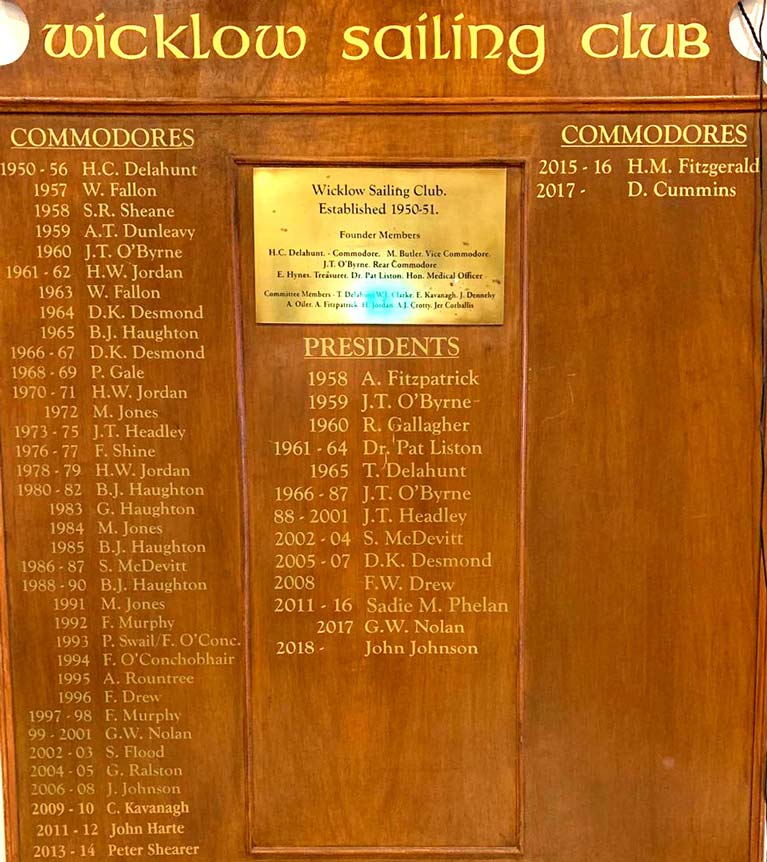 Wicklow Sailing Club Commodores – the size of the membership can be gauged from the fact that some Commodores served more than one spell of duty, with Michael Jones filling the role three times
Wicklow Sailing Club Commodores – the size of the membership can be gauged from the fact that some Commodores served more than one spell of duty, with Michael Jones filling the role three times
From an organiser’s point of view, this is a very satisfactory state of affairs, but it does mean that the workload of running the race has increased exponentially. Michael Jones carried the torch as Race Director from 1980 until 1992, then from 1994 to 1998, Fergus O’Conchobhair took up the reins. He was succeeded by Denis Noonan from 2000 until 2010 when Theo Phelan took over.
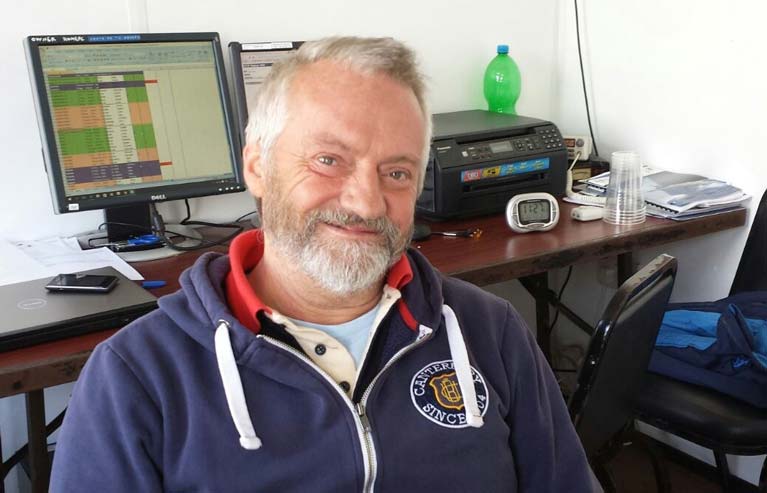 Fergus O’Conchobair was Race Director from 1994 to 1998
Fergus O’Conchobair was Race Director from 1994 to 1998
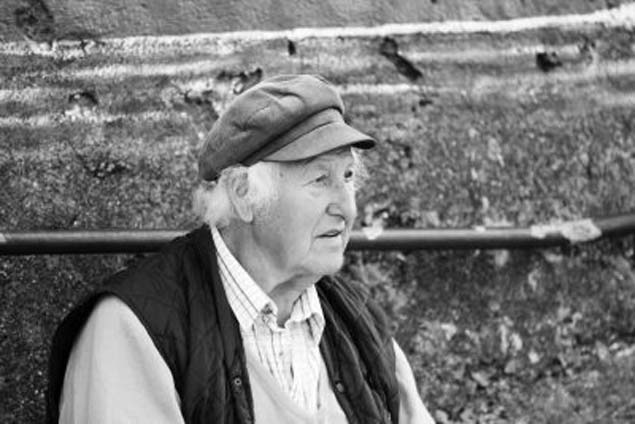 Denis Noonan organised six Round Ireland Races between 2000 and 2010.
Denis Noonan organised six Round Ireland Races between 2000 and 2010.
The effects of the economic recession were hitting very hard as the 2012 race approached, but Theo hung in with total dedication to keep it alive, and it was he who came up the concept of a link to the Royal Irish YC in Dun Laoghaire in time for 2014’s race, which served the big boats particularly well in 2016. Theo in turn retired in February 2018 with Hal Fitzgerald taking over for that year’s race, while for 2020 there has been a spreading of the workload with Hal continuing as Race Director but basically in the demanding backroom role, while the promotional aspects have been taken on by former WSC Commodore Denise Cummins and current Commodore Kyran O’Grady.
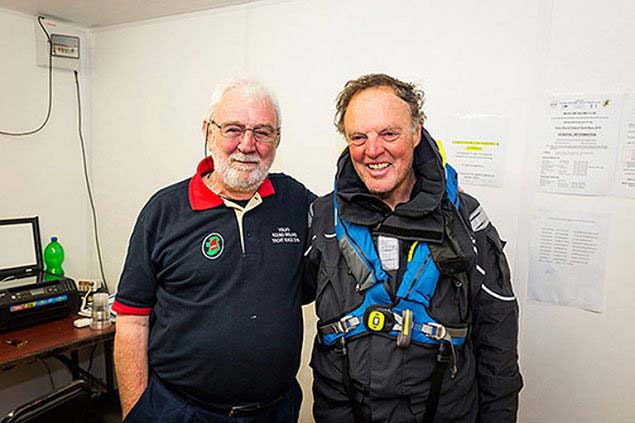 Theo Phelan with Michael Boyd, Commodore RORC, when the latter concluded his second Round Ireland Race in 2016, twenty years after winning overall in 1986
Theo Phelan with Michael Boyd, Commodore RORC, when the latter concluded his second Round Ireland Race in 2016, twenty years after winning overall in 1986 Hal Fitzgerald, a former Commodore of WSC, has been Race Director since 2018
Hal Fitzgerald, a former Commodore of WSC, has been Race Director since 2018
This new setup makes sense because, successful and all as the Round Ireland race has become, it is operating in an increasingly challenging market, with 2020’s plethora of major anniversaries in Irish sailing providing several rival attractions. Thus the Wicklow folk have to spread their international message, and the French market, in particular, has been targeted, with promotional visits to the Paris Boat Show in December (where they received support from offshore superstar Charles Caudrellier), and then in January, Kyran O’Grady was invited to give an event presentation at the annual gala prize-giving of UNCL, the French equivalent to the RORC.
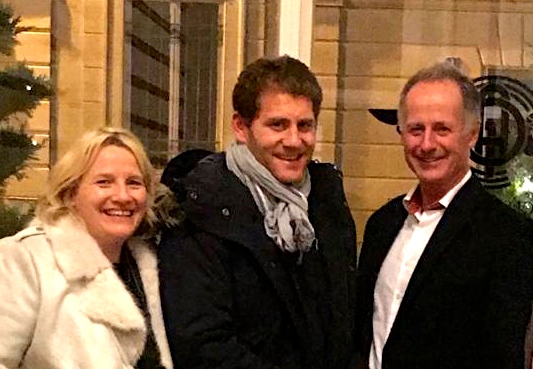 International promotion. Former WSC Commodore Denise Cummins, France’s Yachtsman of the Year Charles Caudrellier, and WSC Commodore Kyran O’Grady at the Paris Boat Show in December.
International promotion. Former WSC Commodore Denise Cummins, France’s Yachtsman of the Year Charles Caudrellier, and WSC Commodore Kyran O’Grady at the Paris Boat Show in December.
But while the backbone of the SSE Renewables Round Ireland Race in 2020 will continue to be fully-crewed IRC boats, the race also caters for a growing number of Class 40s which find the course well suited to their needs, while as ever Multi-hulls are very welcome and the two-handed division is increasingly significant, particularly if there’s a new emphasis on having female/male crews in line with the thinking towards the new class in the 2024 Olympics.
At the other extreme, after the 1937-built classic Maybird (Darryl Hughes) became the first gaff-rigged boats and the oldest ever to complete the Round Ireland course in 2018, the newly-instated Maybird Mast trophy will honour the race’s most senior boat.
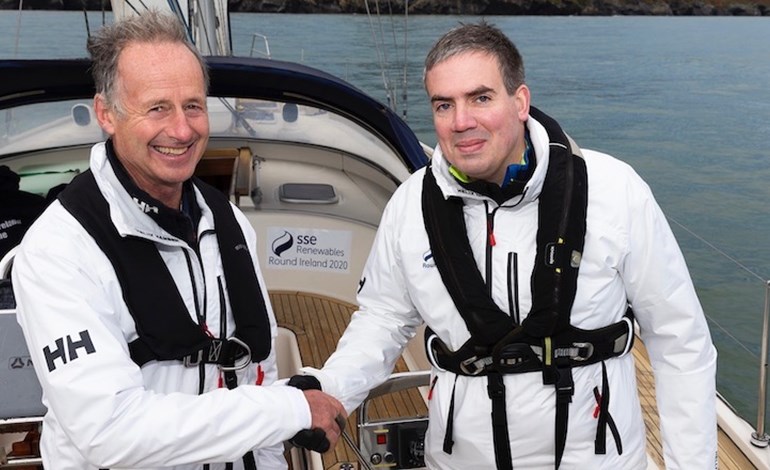 The clean way ahead, WSC Commodore Kyran O’Grady with Barry Kilcline of SSE Renewables after agreement had been reached for SSE to sponsor the Round Ireland Race. Photo courtesy WSC
The clean way ahead, WSC Commodore Kyran O’Grady with Barry Kilcline of SSE Renewables after agreement had been reached for SSE to sponsor the Round Ireland Race. Photo courtesy WSC
Thus the challenge of racing round Ireland retains its timeless attraction, but how you take it on is something which is constantly being modified and updated by the team in Wicklow Sailing Club. They’re so busy getting on with it that they scarcely seem to notice the prodigious amount of voluntary work which is necessary to keep this unique show on the road. As for the rest of us, we can best acknowledge this by realising that an Irish sailing CV isn’t really complete without at least one Round Ireland Race in its list of achieved projects.
Round Ireland Yacht Race Promoted at UNCL Prizegiving in Paris
SSE Renewables Round Ireland Race organiser Kyran O'Grady led a Wicklow Sailing Club delegation to France in December to address the Union Nationale pour la Course au Large (UNCL) prizegiving in Paris.
Keen to encourage French and international numbers for this year's biennial Irish offshore classic in June, the Wicklow Commodore also revealed a special draw prize for foreign boats coming to Ireland this summer.
Using impressive visuals from from the race, O'Grady took the opportunity to point out the unique features of the 700-miler that celebrates its 21st edition in 2020. "Not alone do you go around the Fastnet Rock but also around Ireland with for tidal gates, the Open Atlantic Ocean on the west coast before coming very close to Scotland and a finish further down the Irish Sea and a warm welcome back in Wicklow," he told the important French gathering.
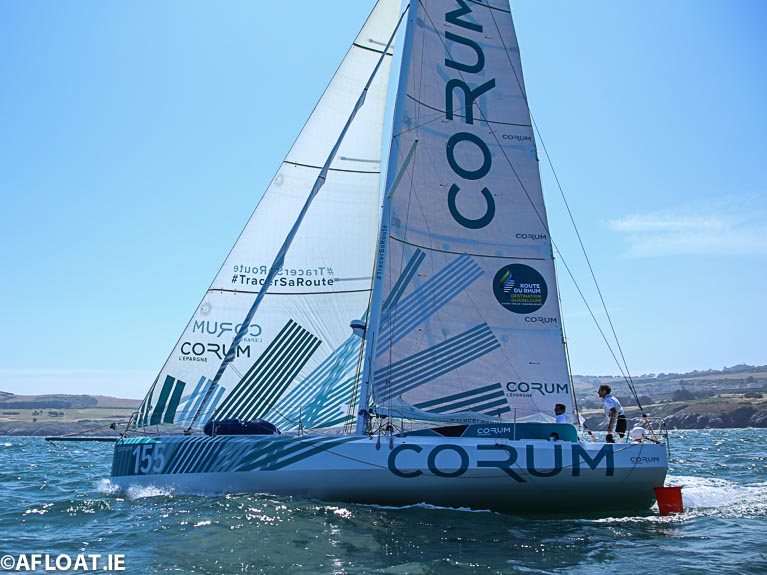 In the 2018 Round Ireland Race, The French Mach 40 had three French sailing stars onboard Nicolas Troussel, Ian Lipinski and Aymeric Belloir for the circuit Photo: Afloat
In the 2018 Round Ireland Race, The French Mach 40 had three French sailing stars onboard Nicolas Troussel, Ian Lipinski and Aymeric Belloir for the circuit Photo: Afloat
In co-operation with the British offshore racing club, RORC, UNCL is responsible for IRC, the principal international handicap system for yacht racing.
O'Grady also announced that French boats that enter both the Round Ireland Race in June and July's Cork Week Regatta in Cork Harbour will be entered into a draw for a case of Irish whiskey from Irish Distillers.
Entry in the 2020 Round Ireland Race is expected to open on January 20th with the race organisers already announcing the leaderboard for the Volvo Car Prize and a new trophy for the oldest boat in the race.



























